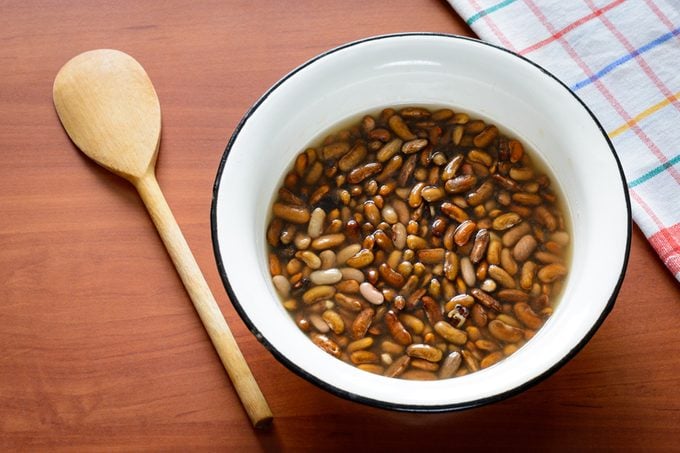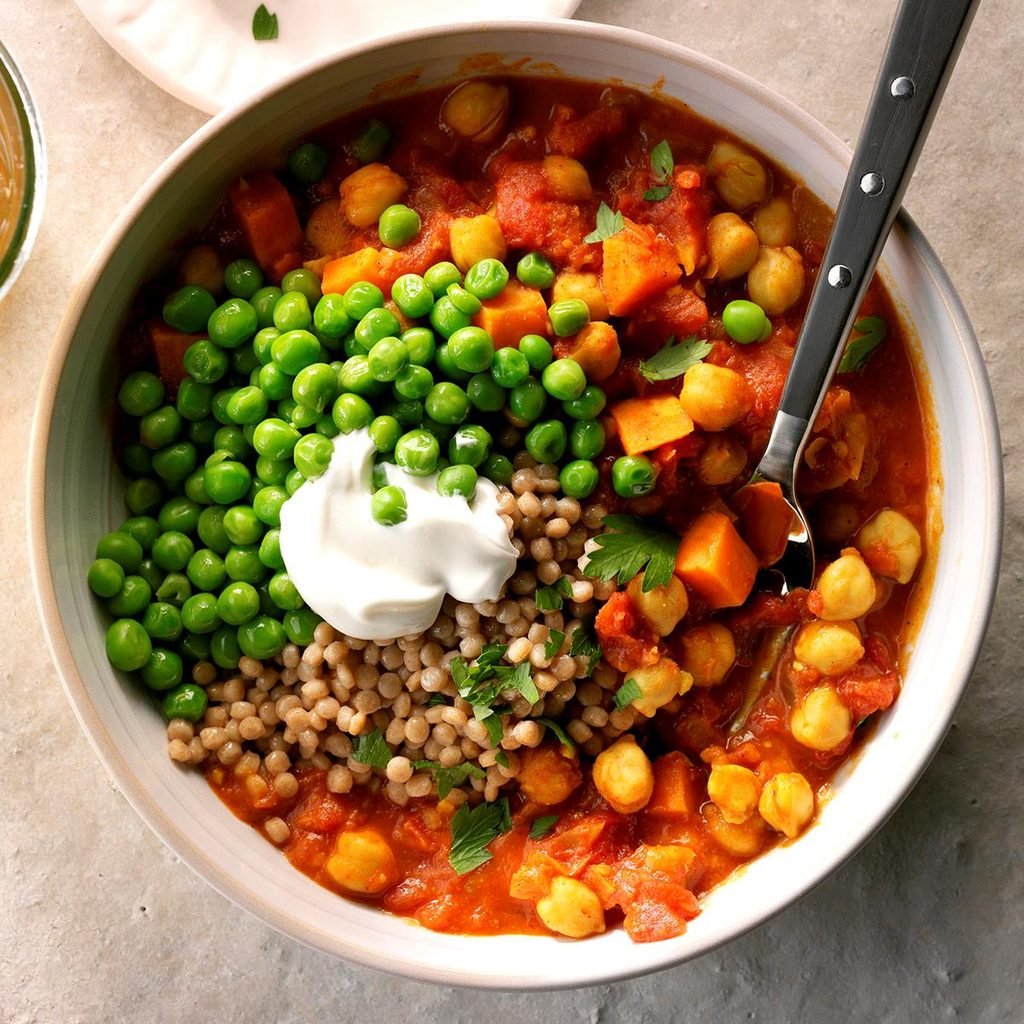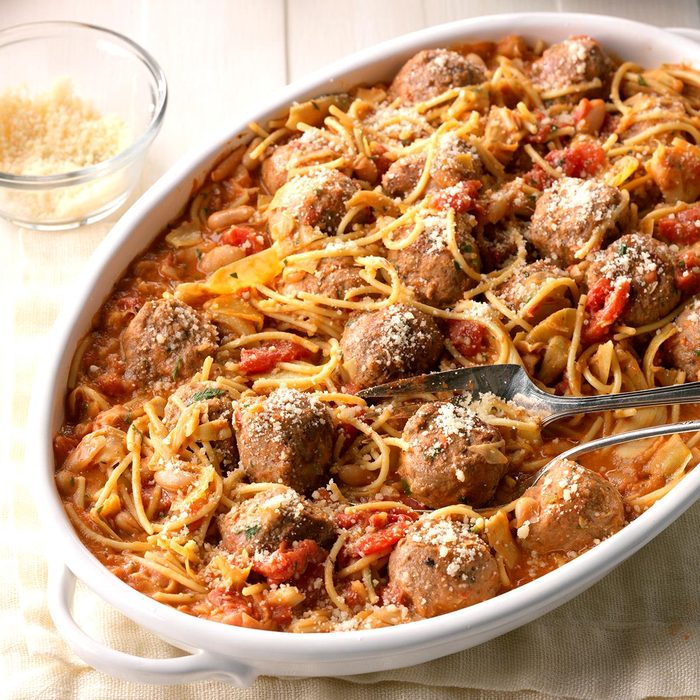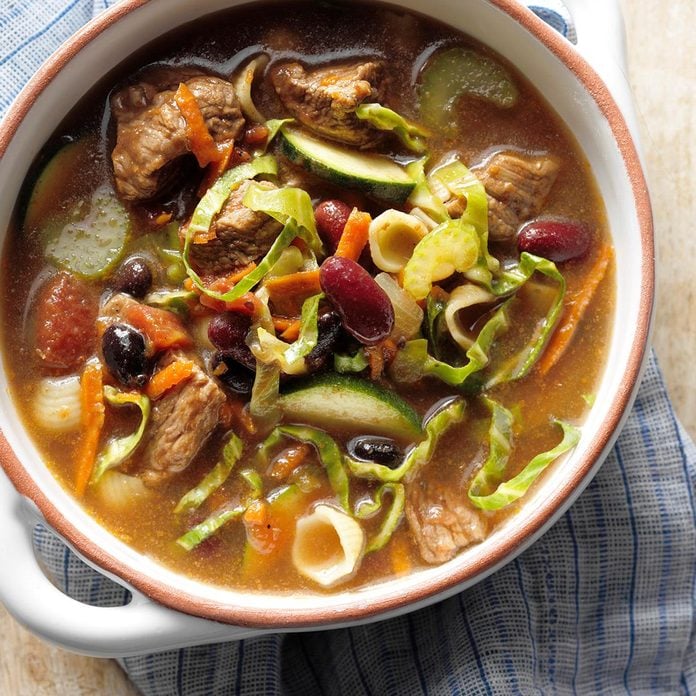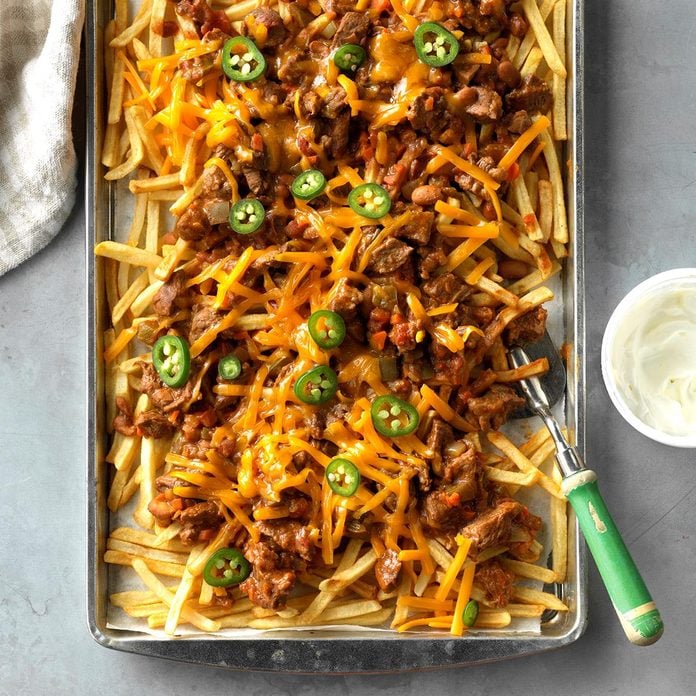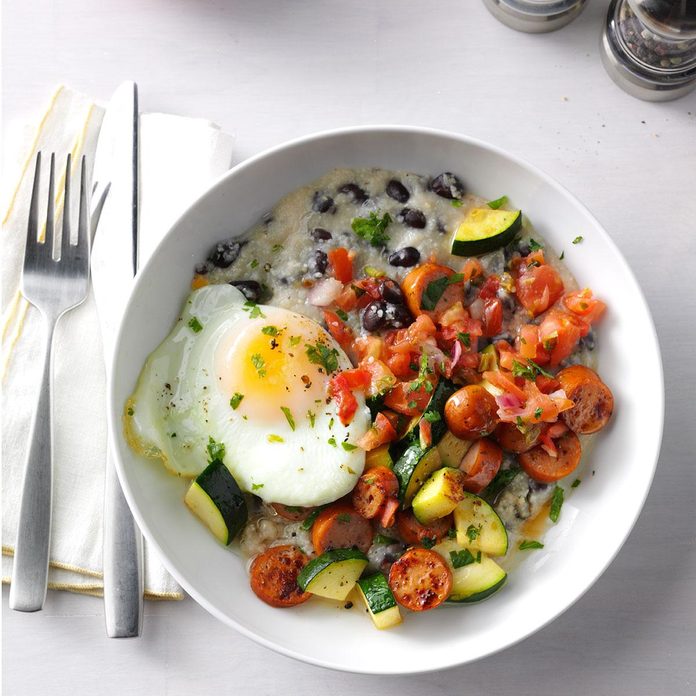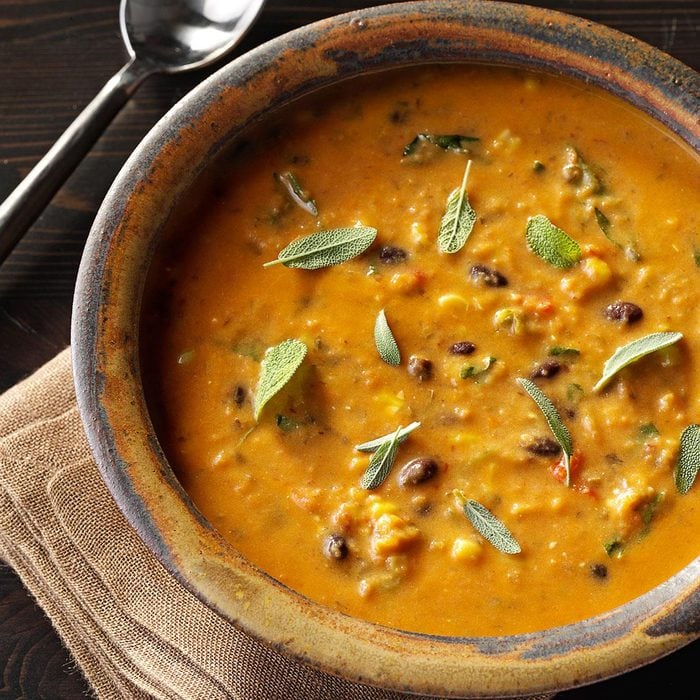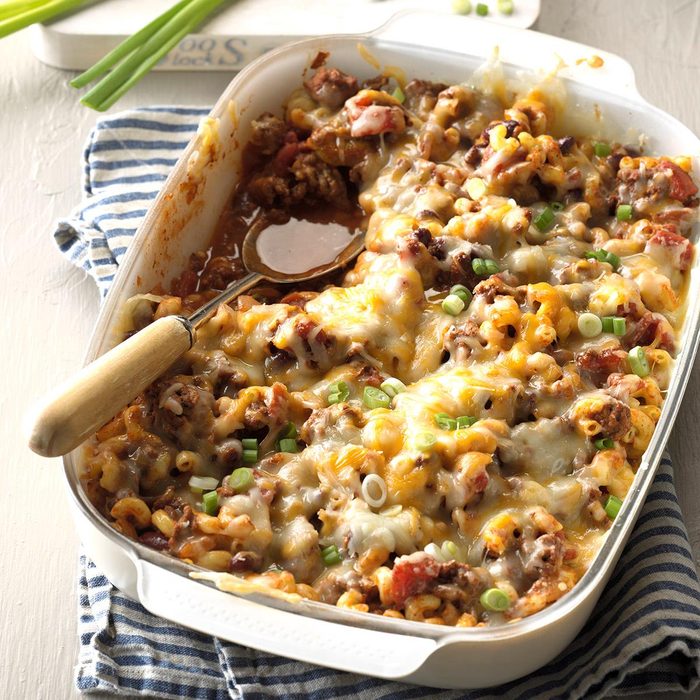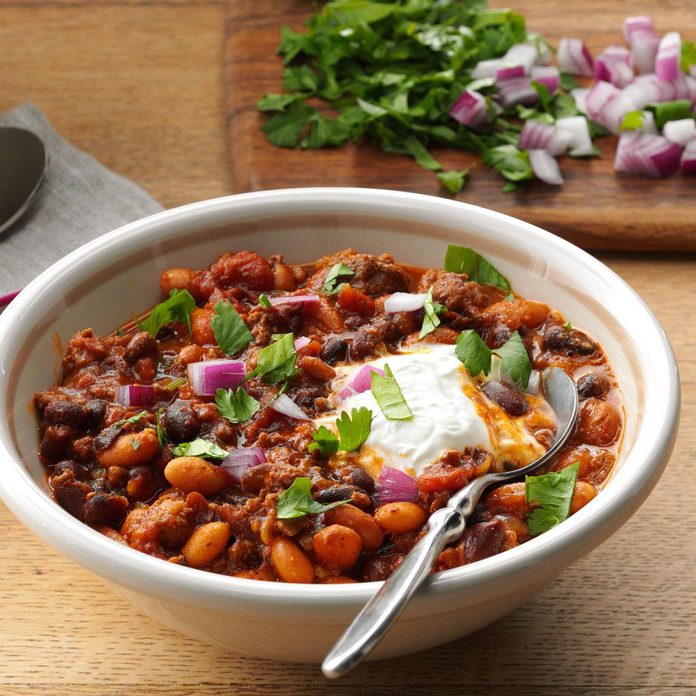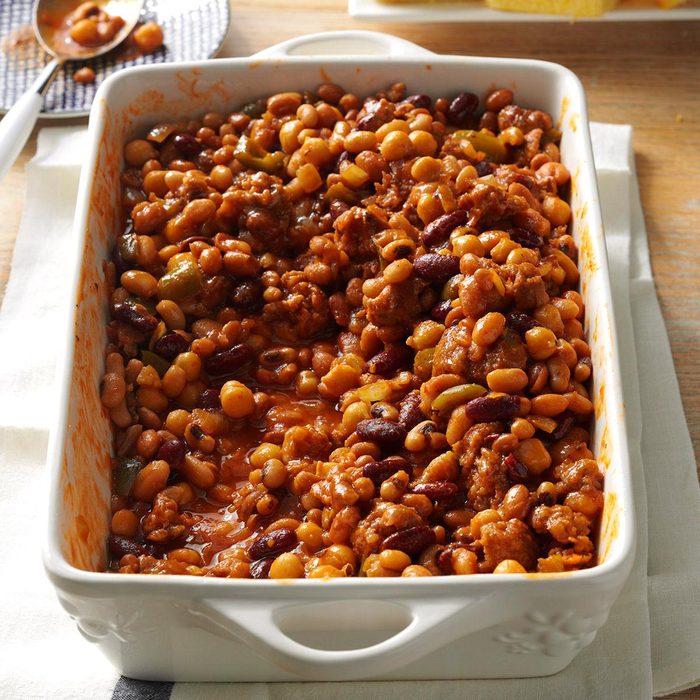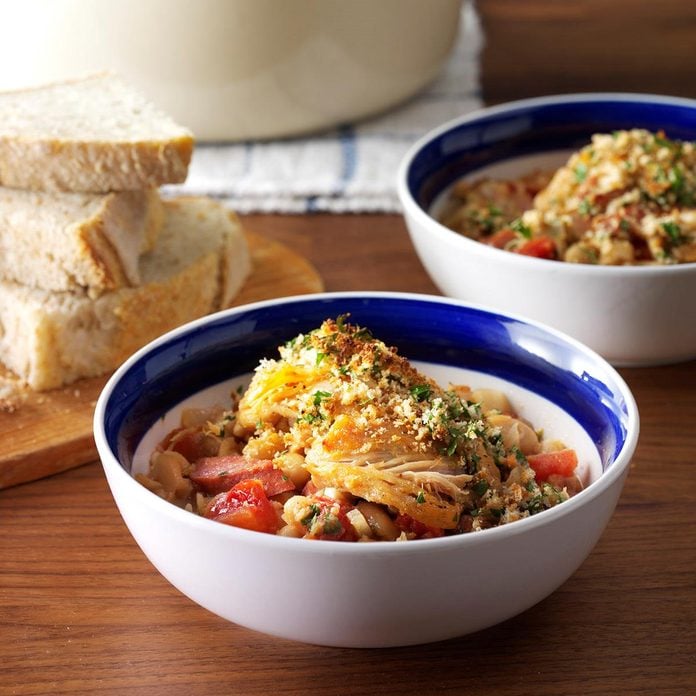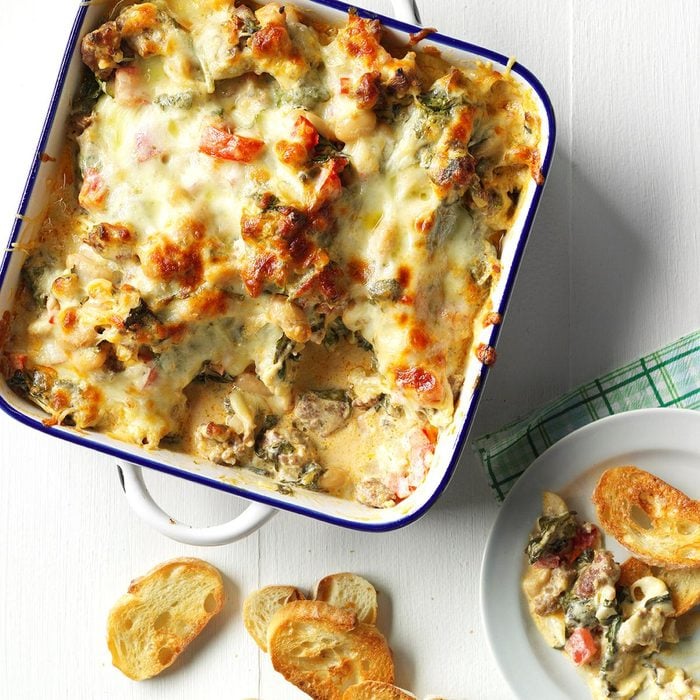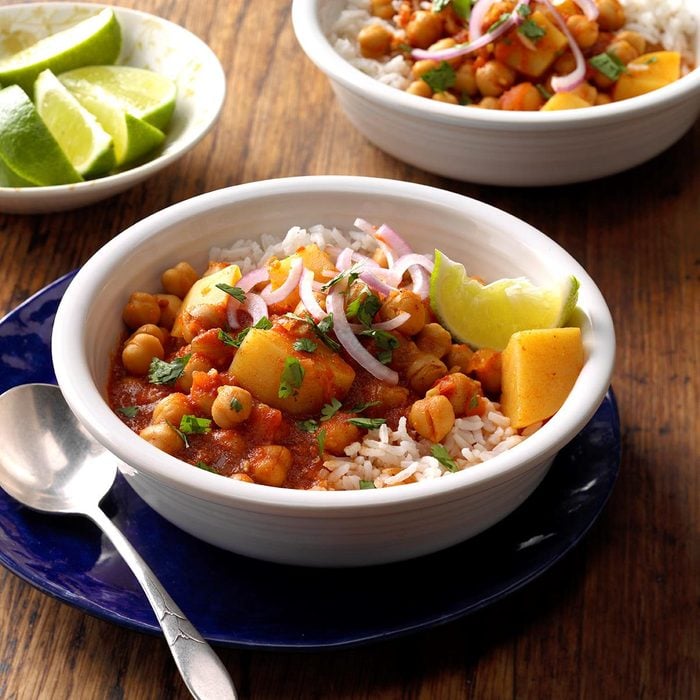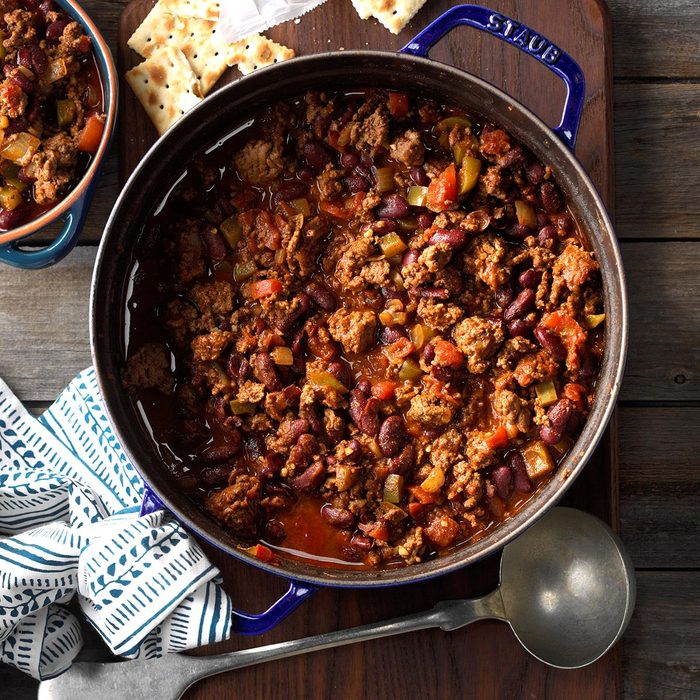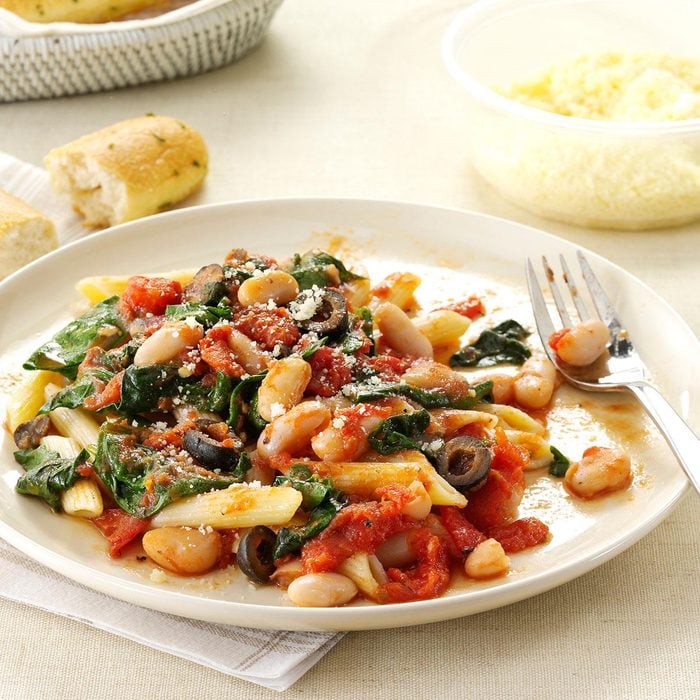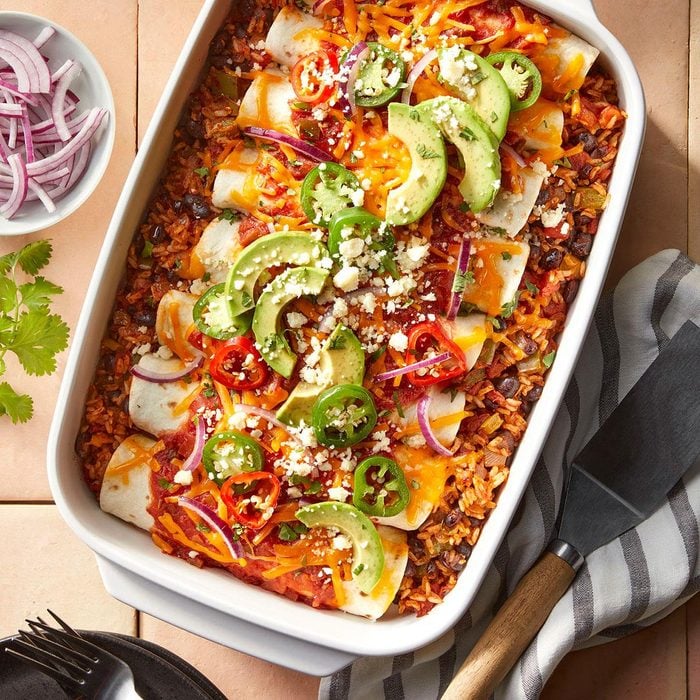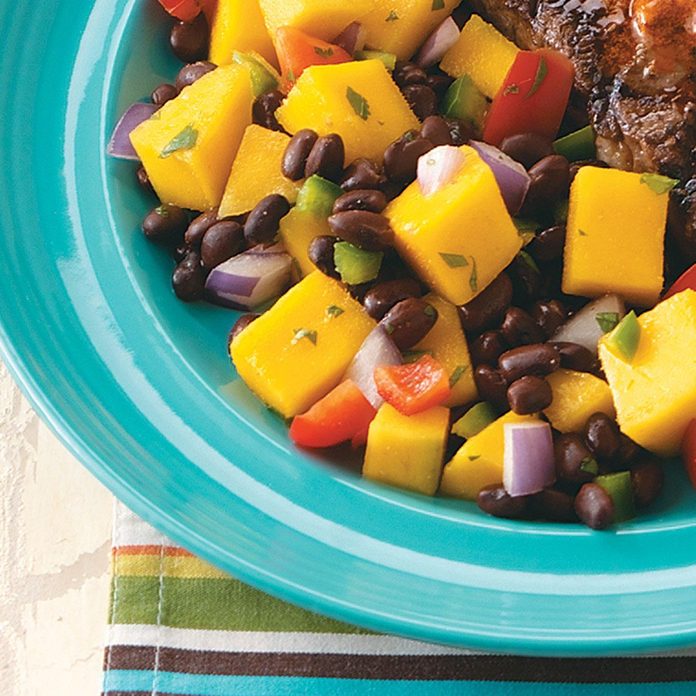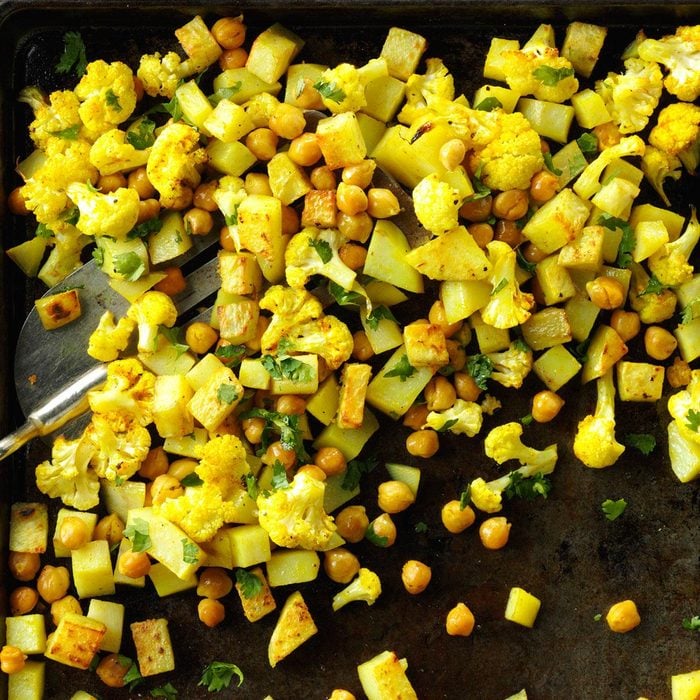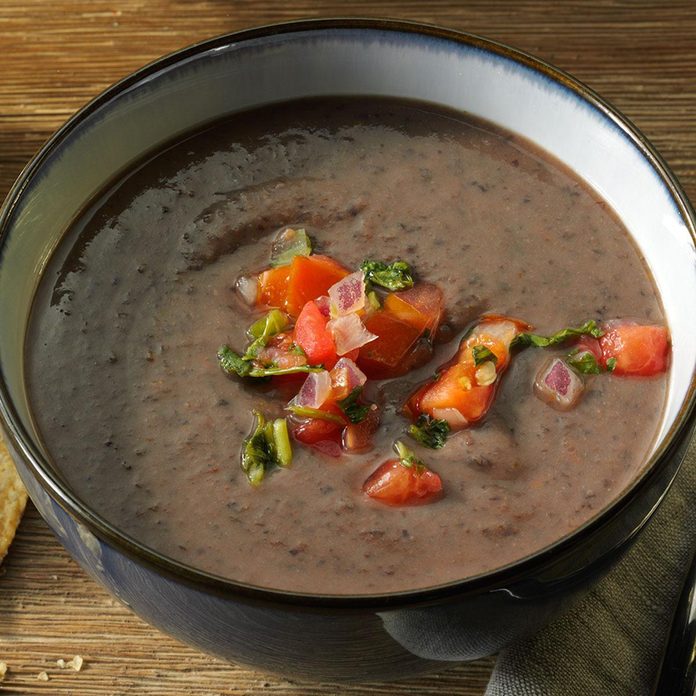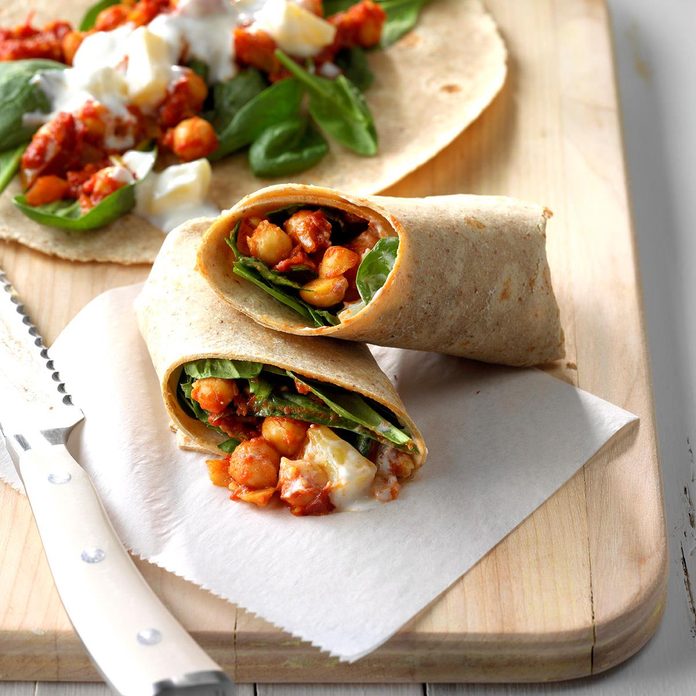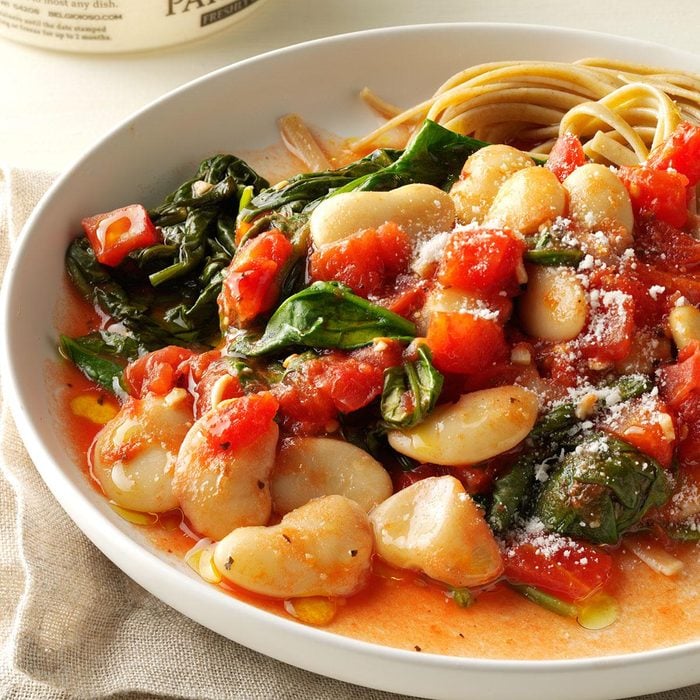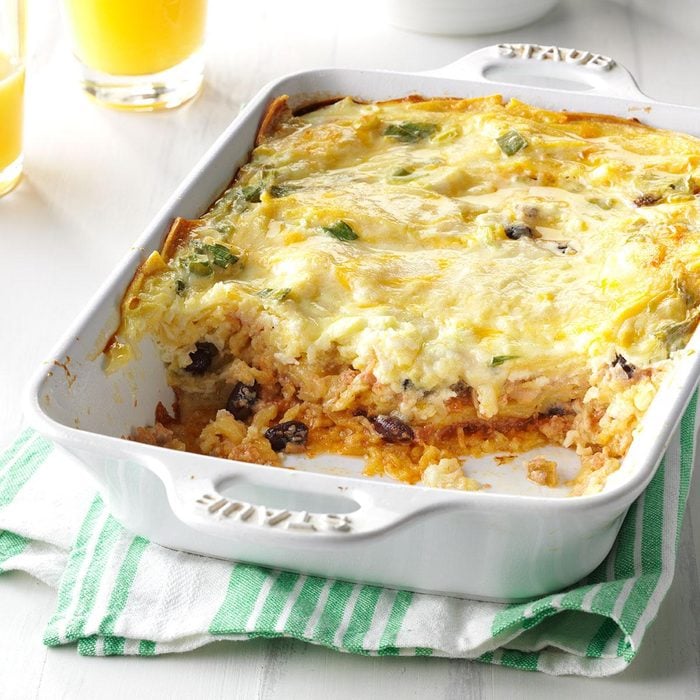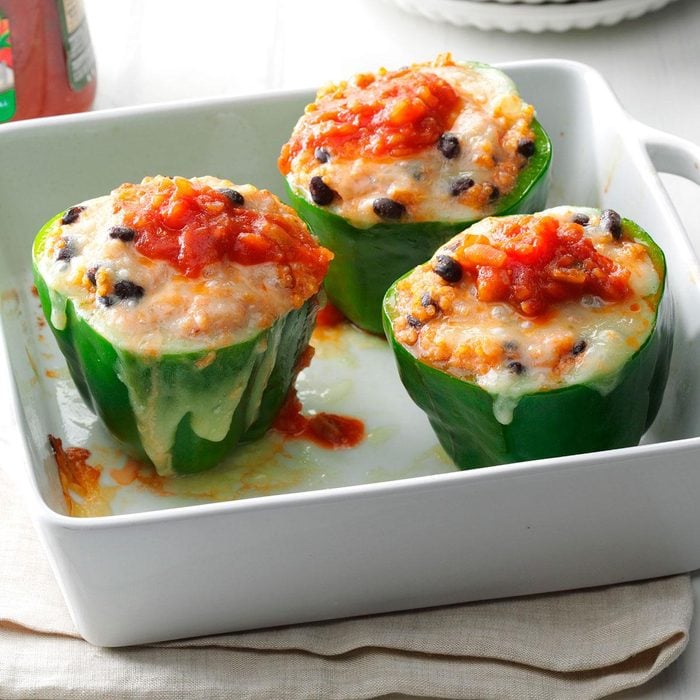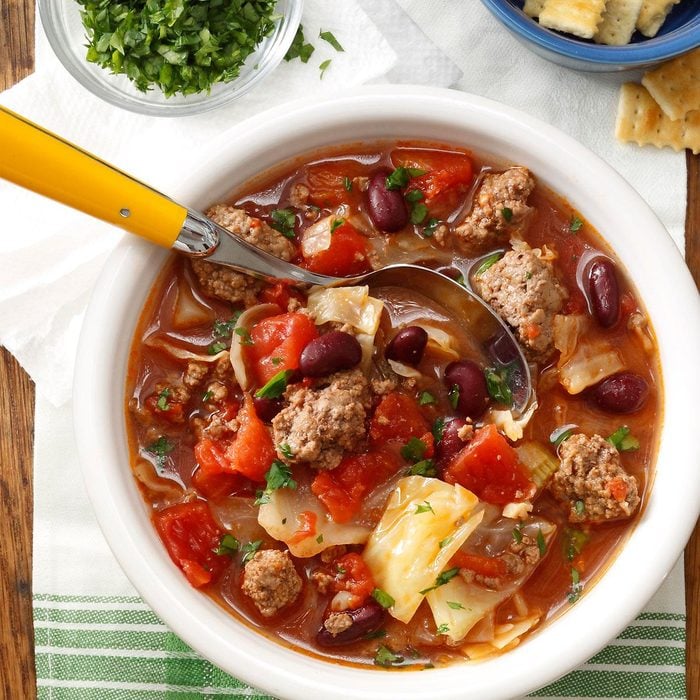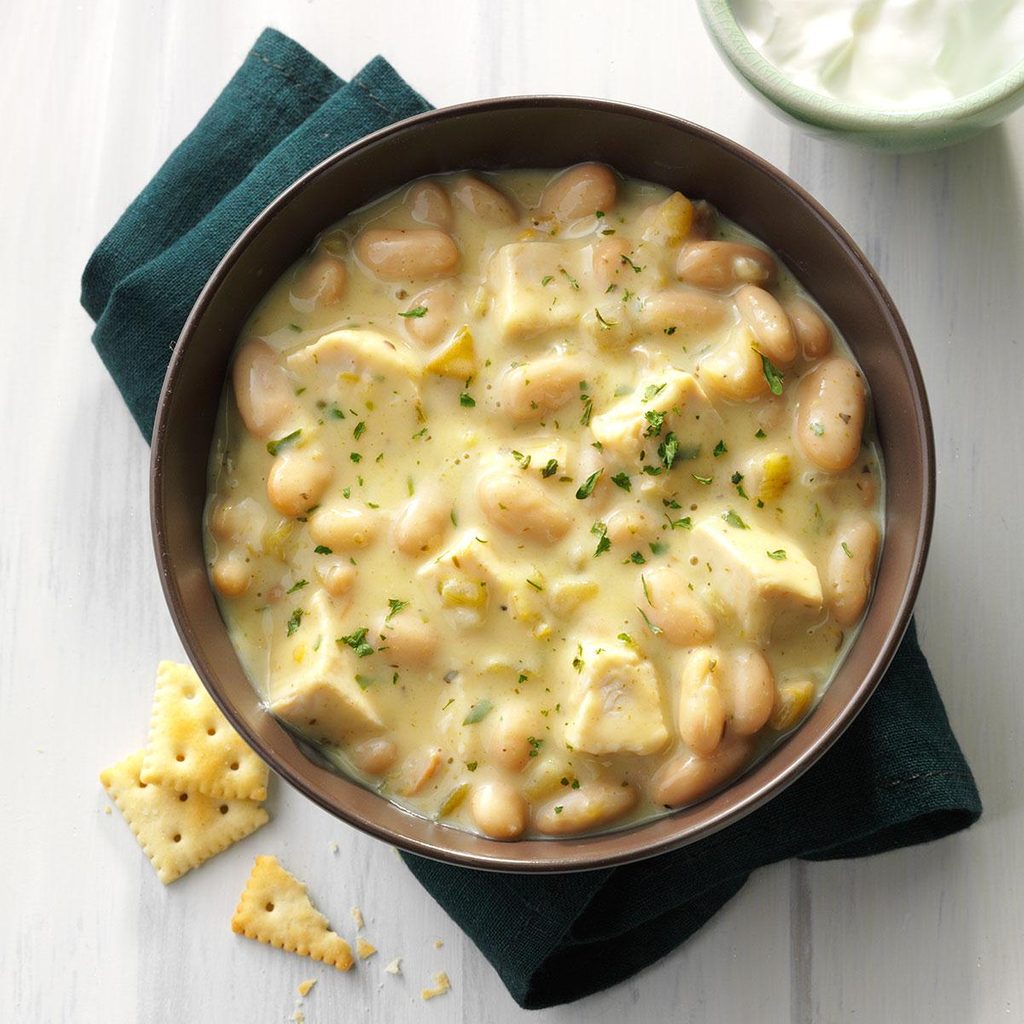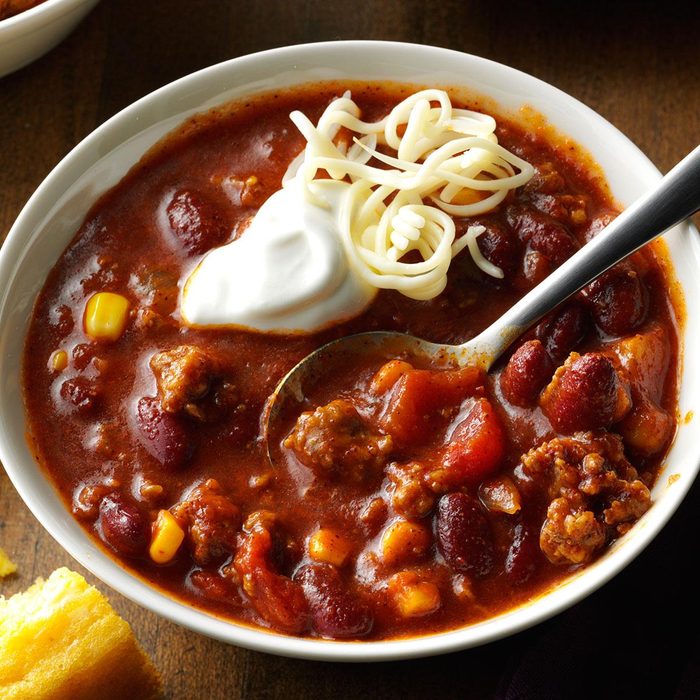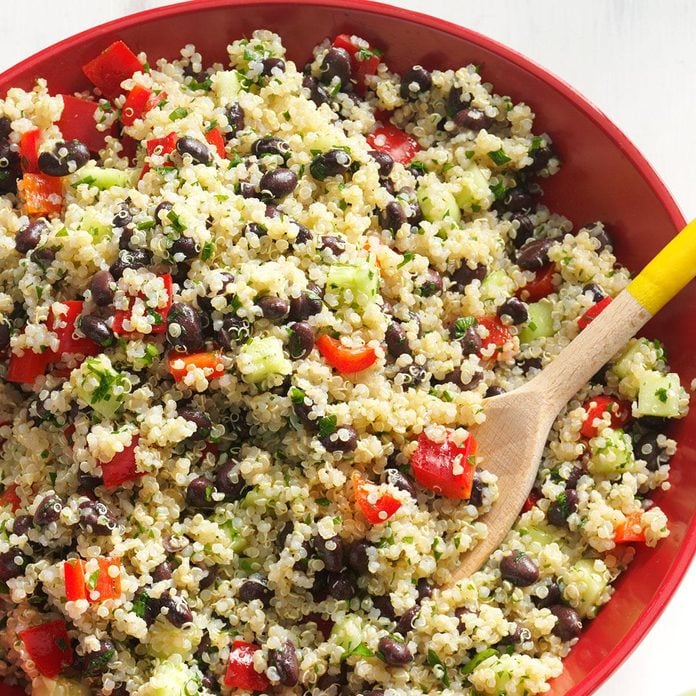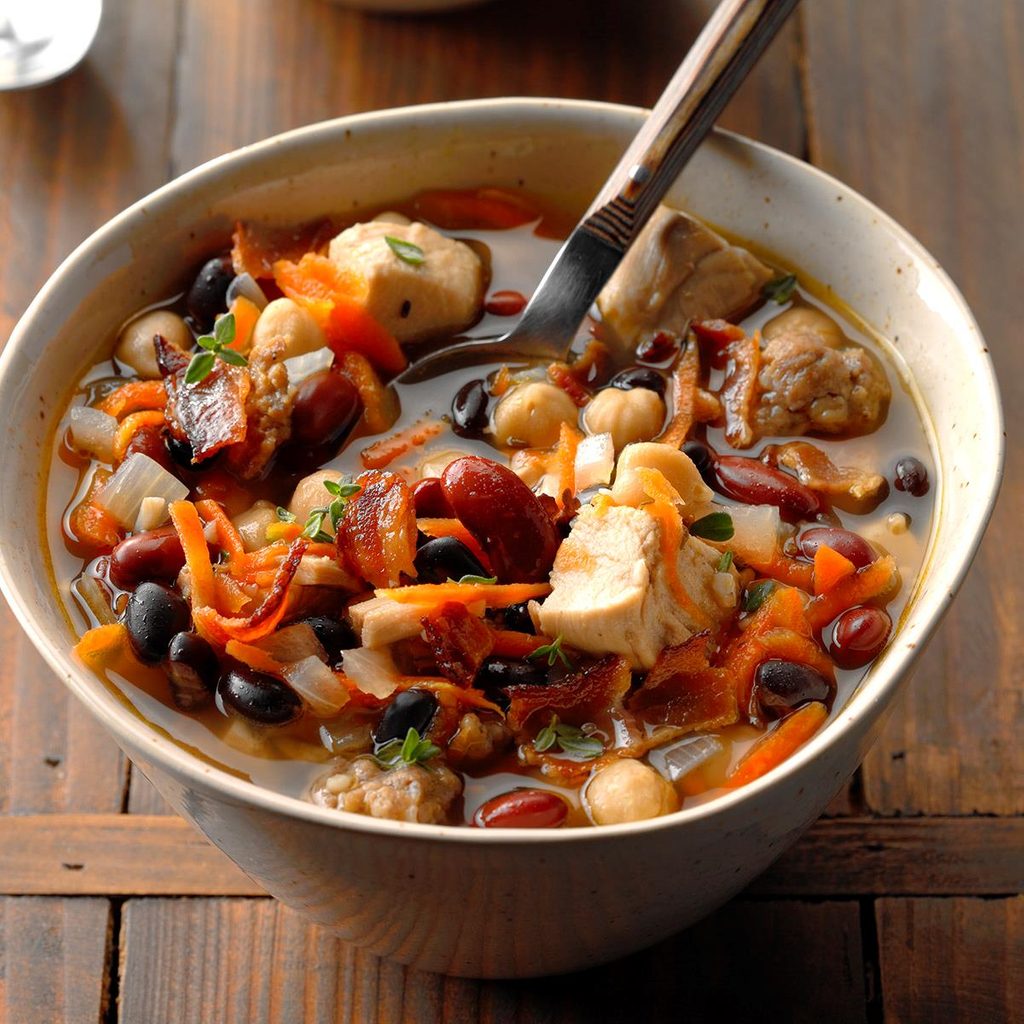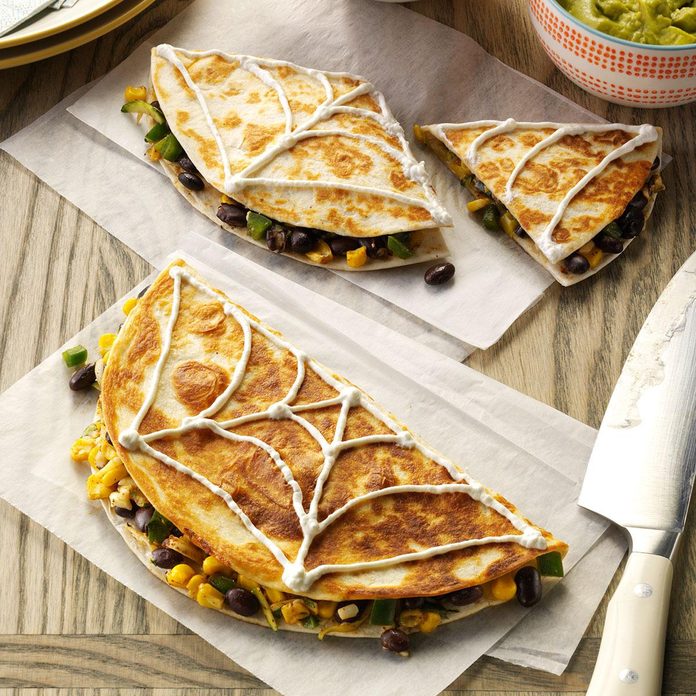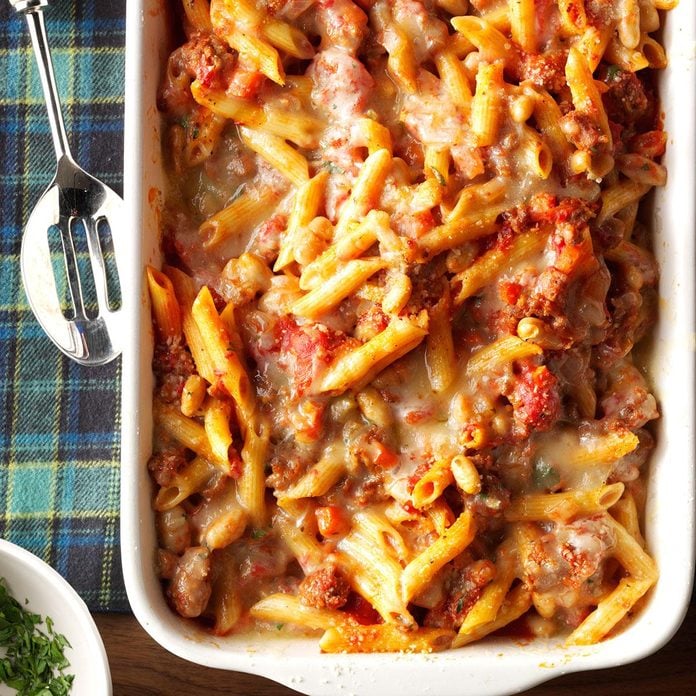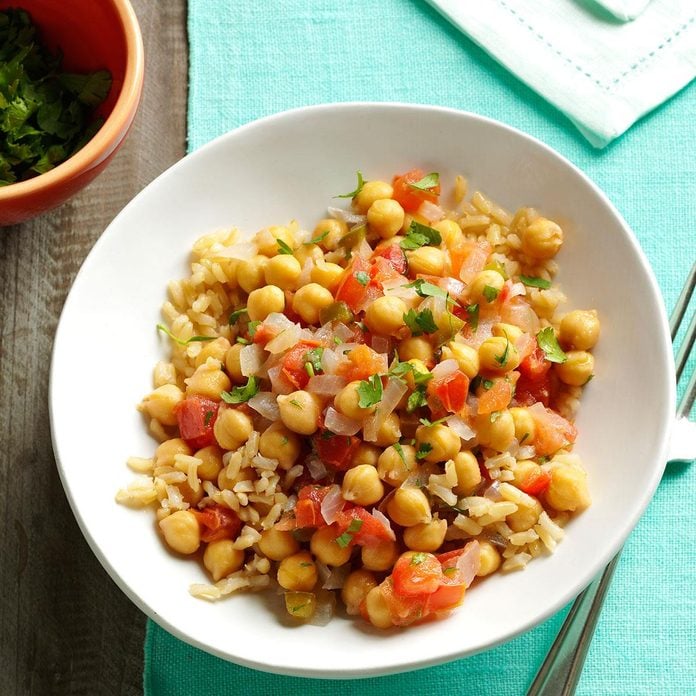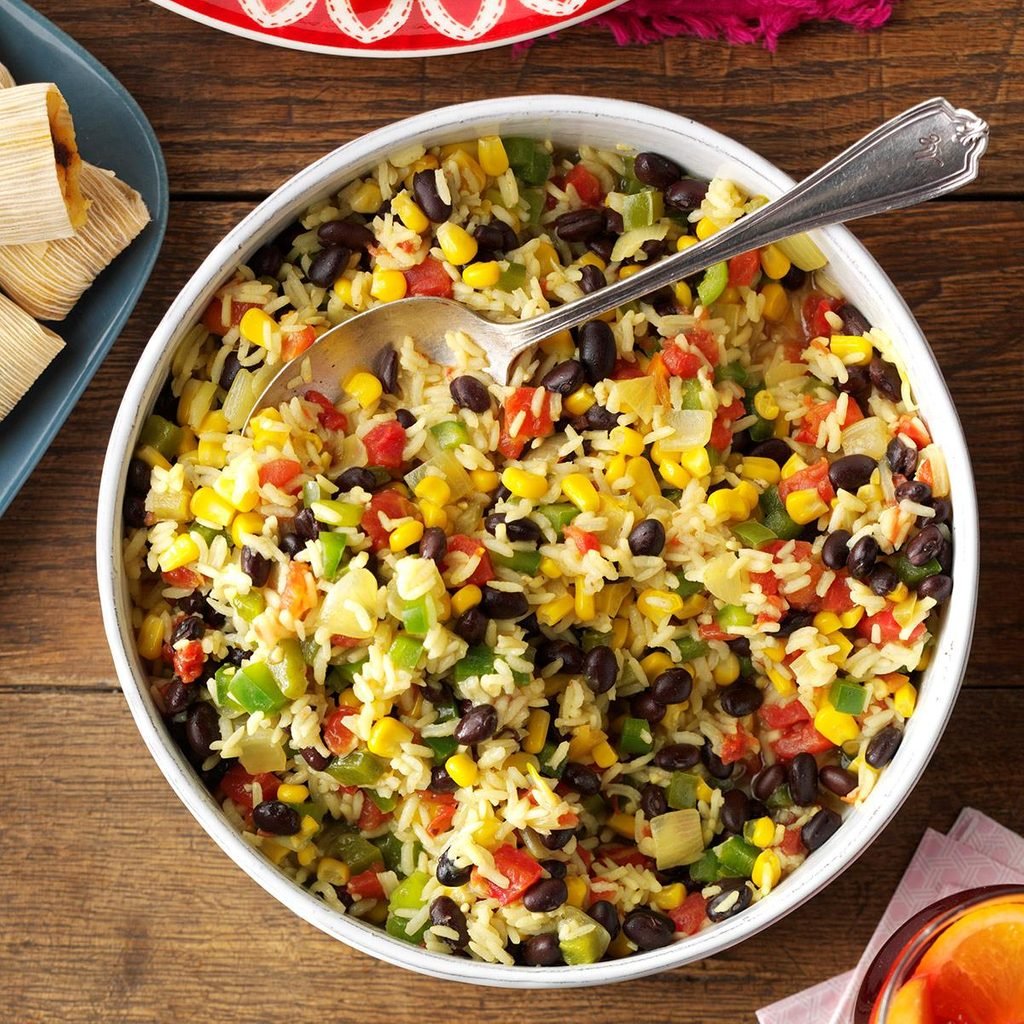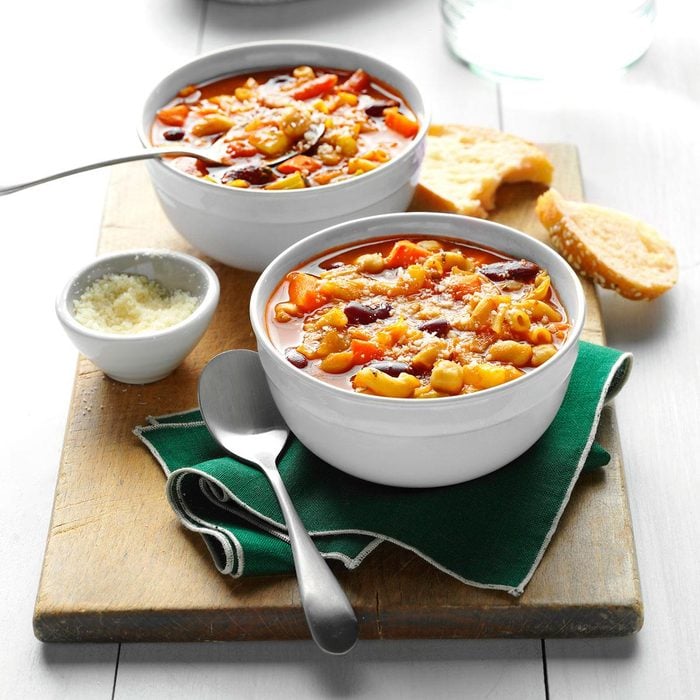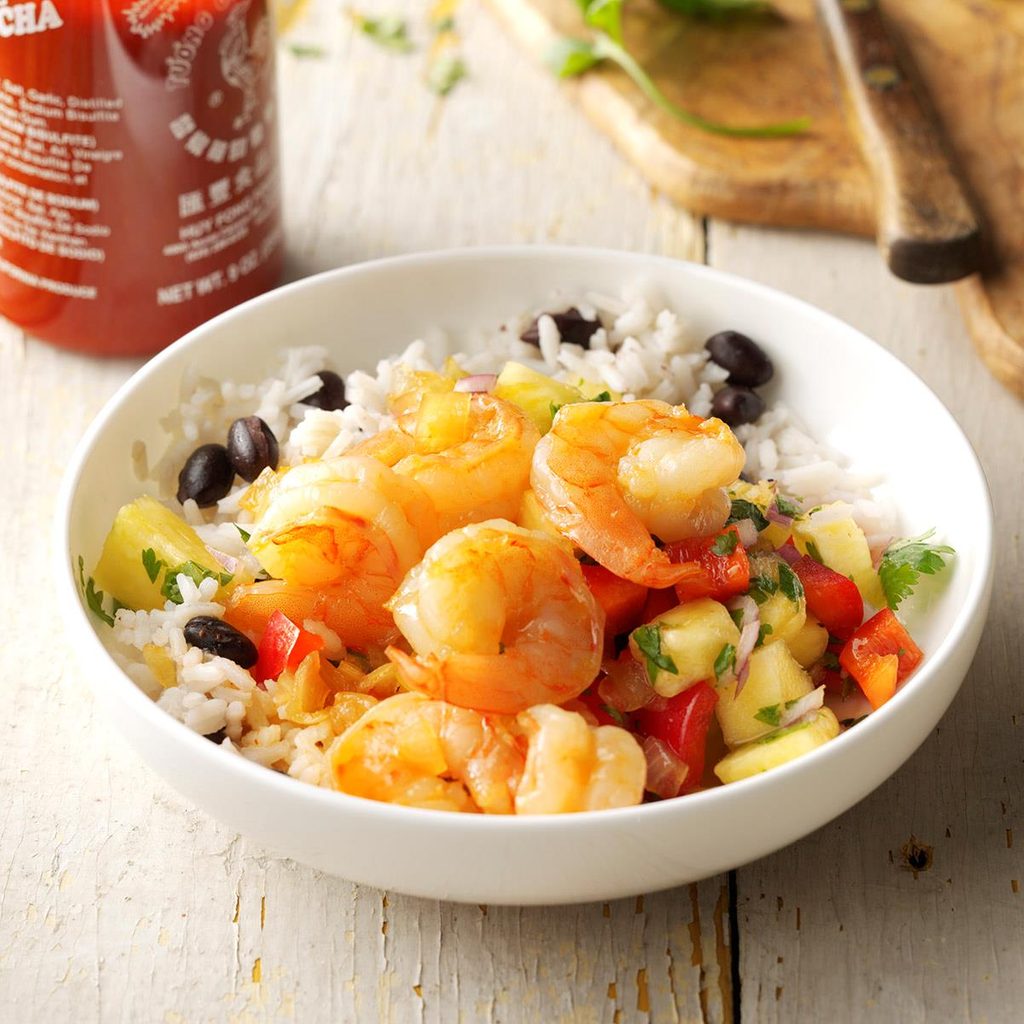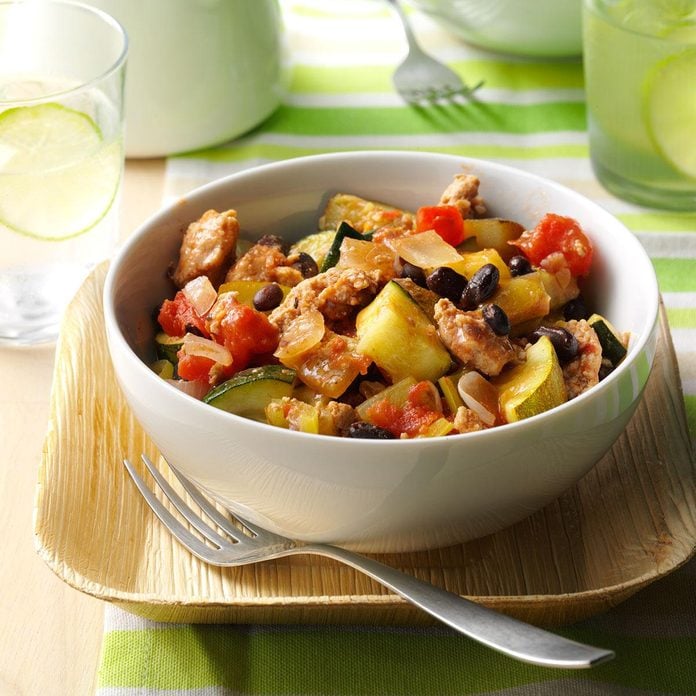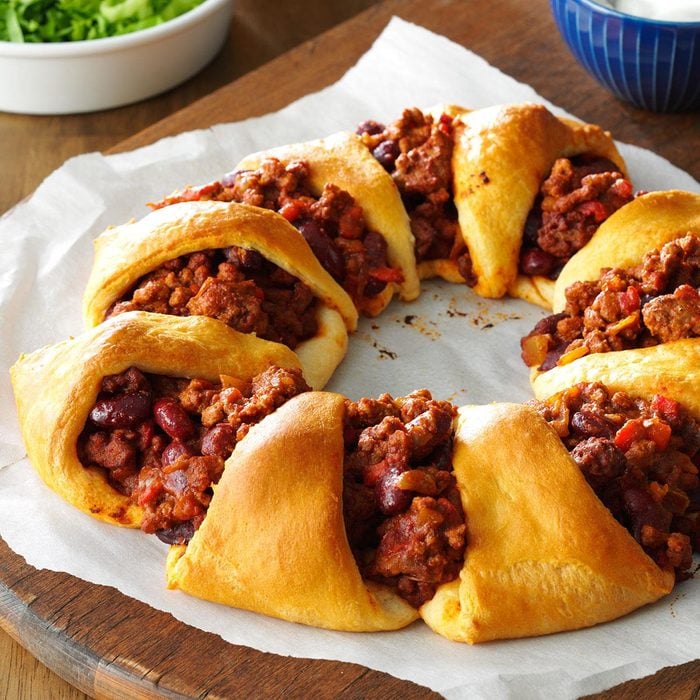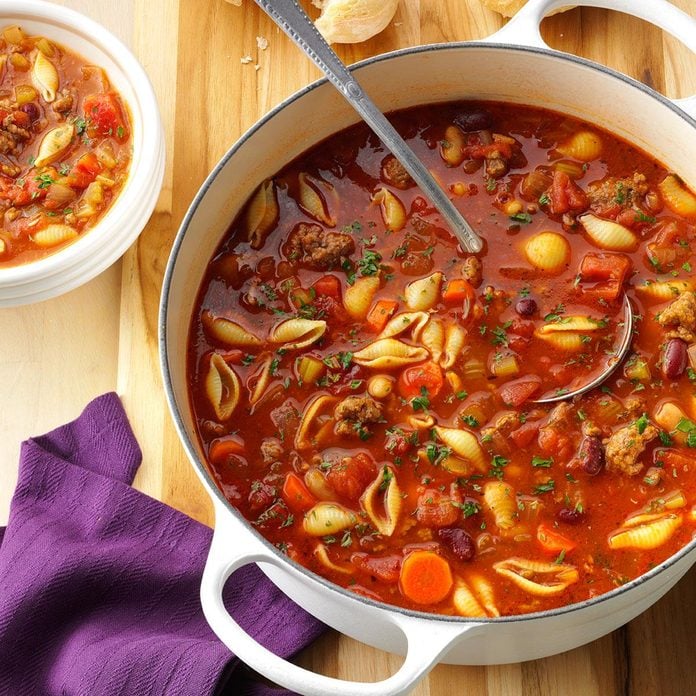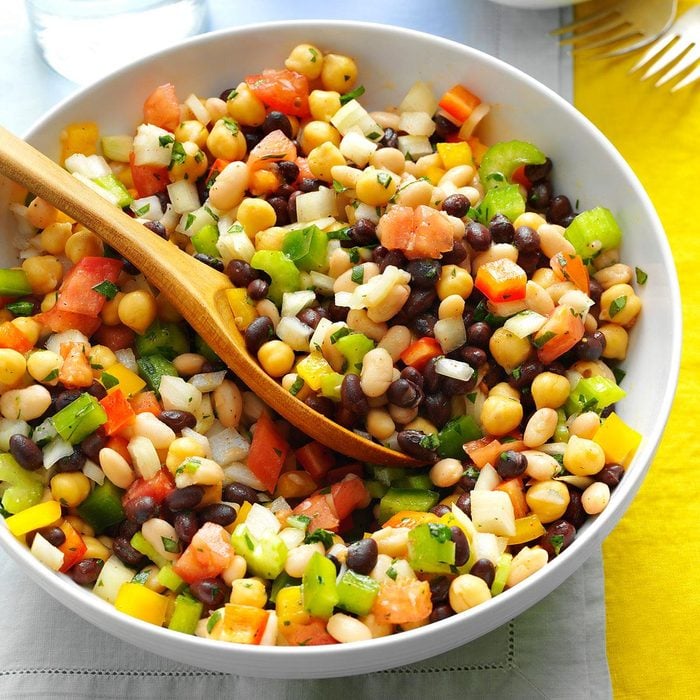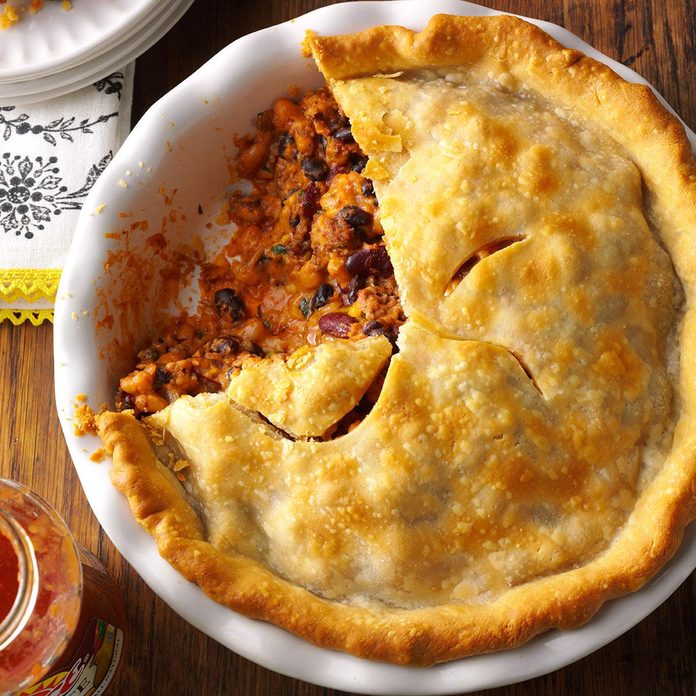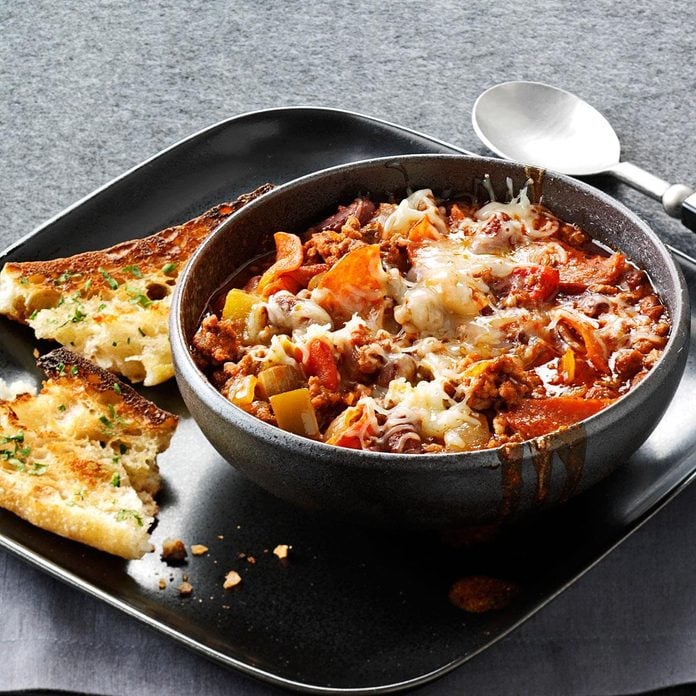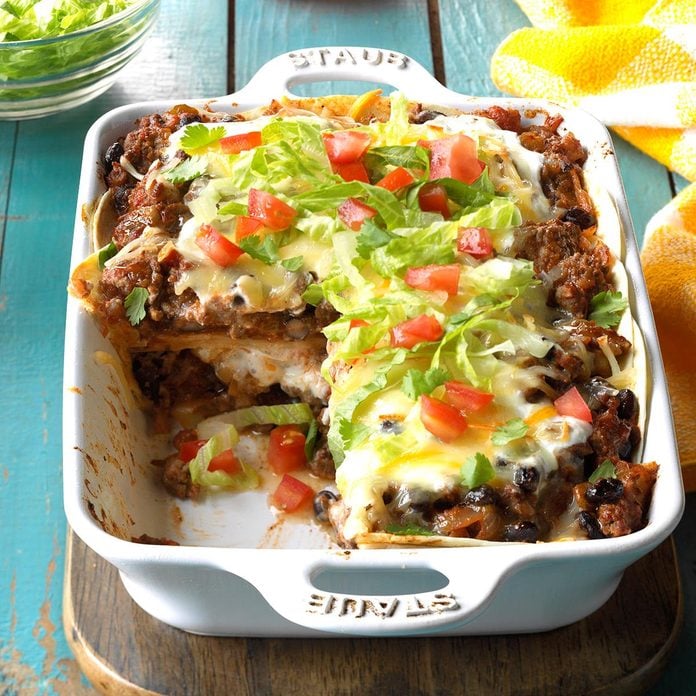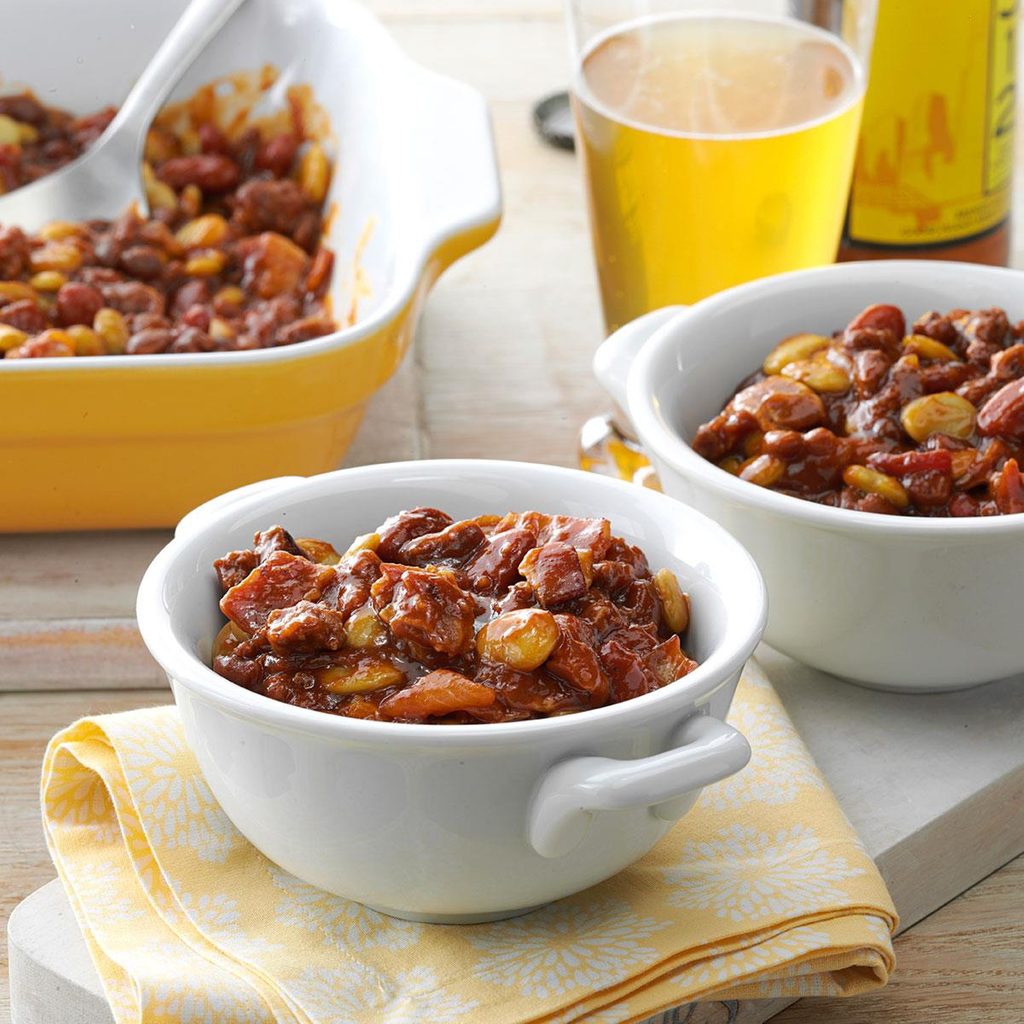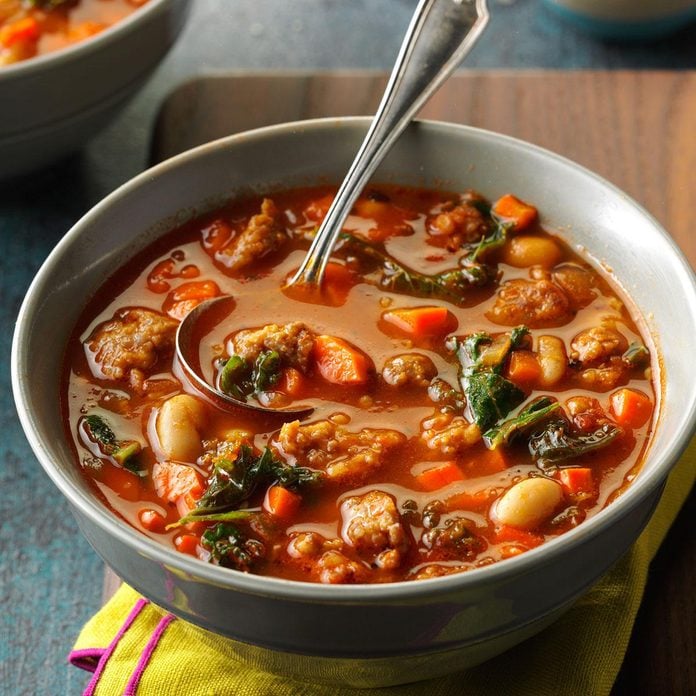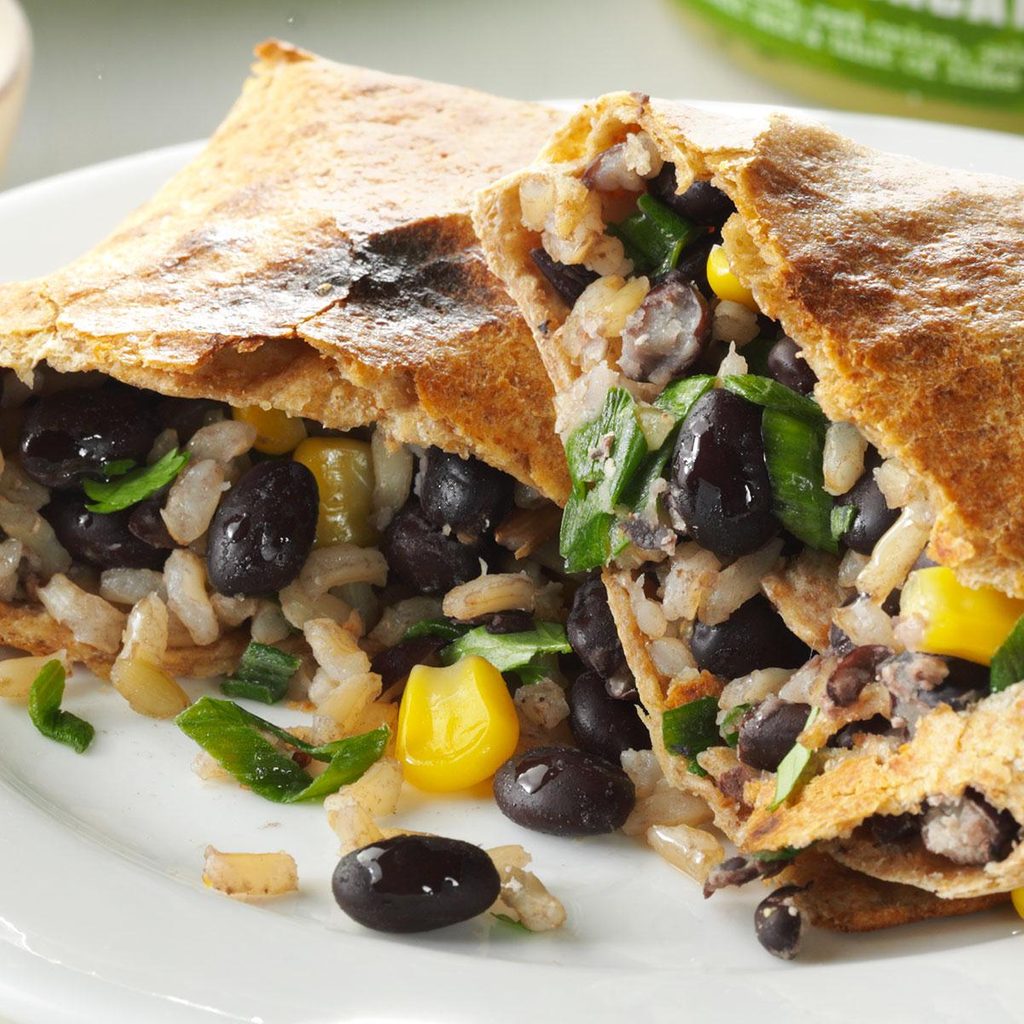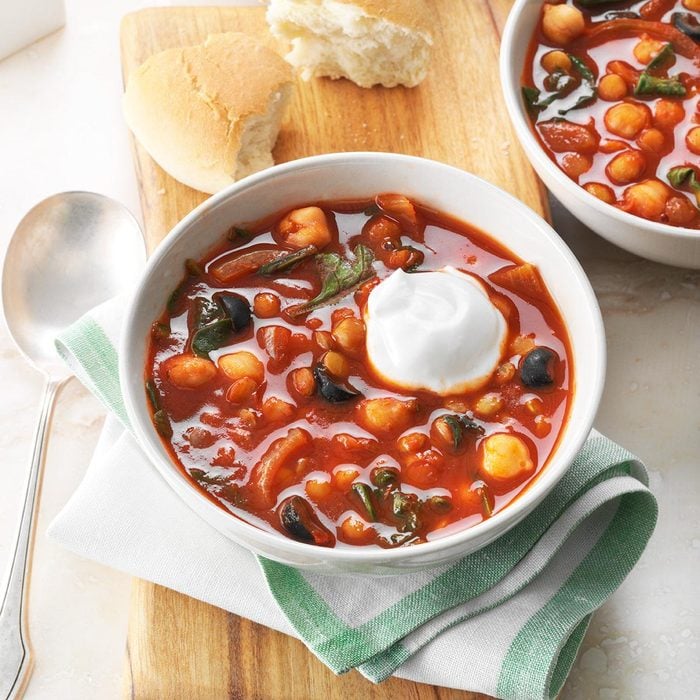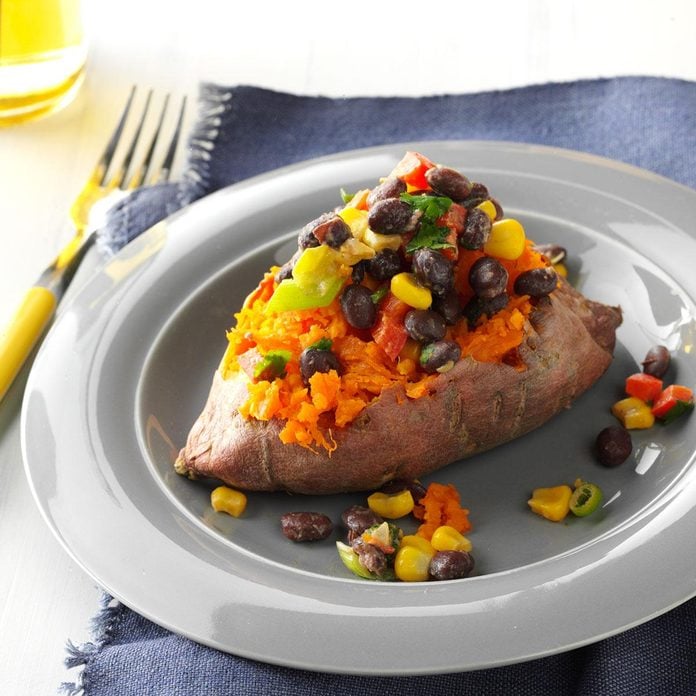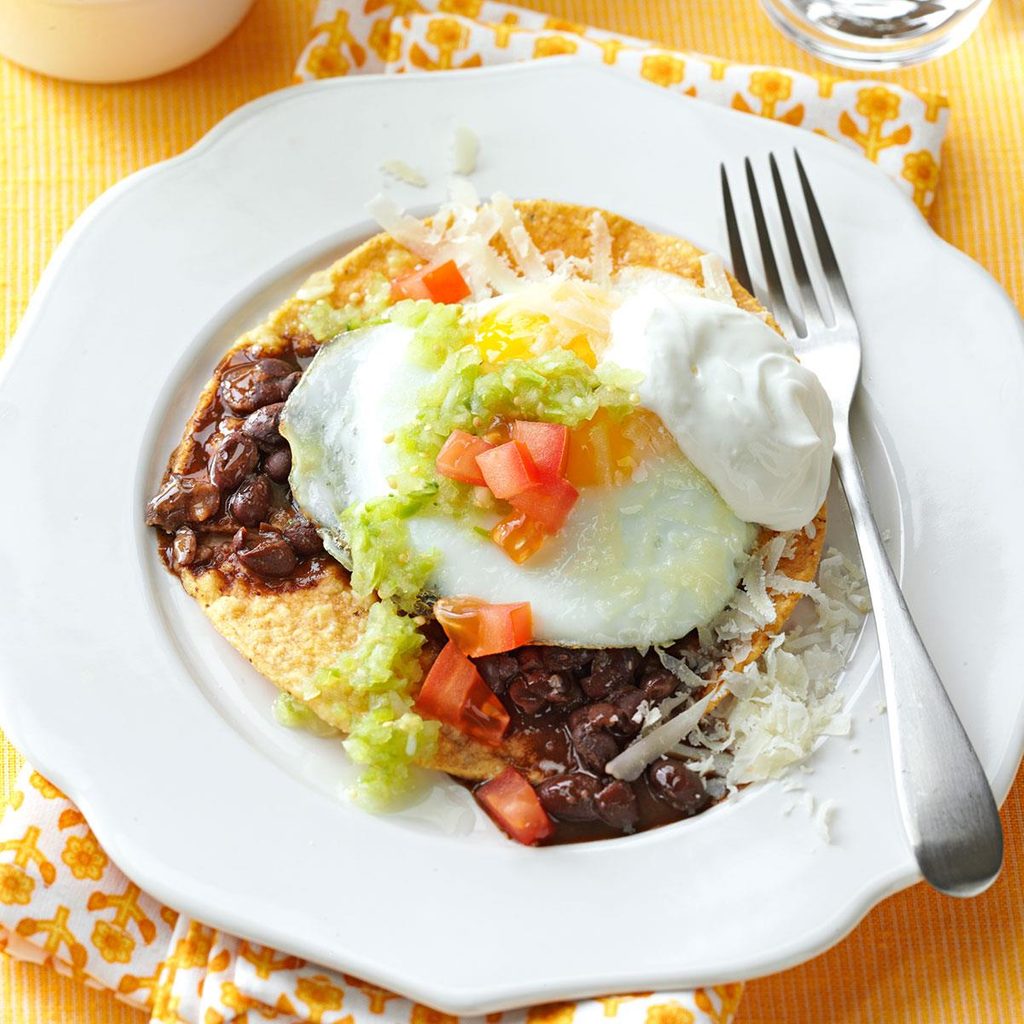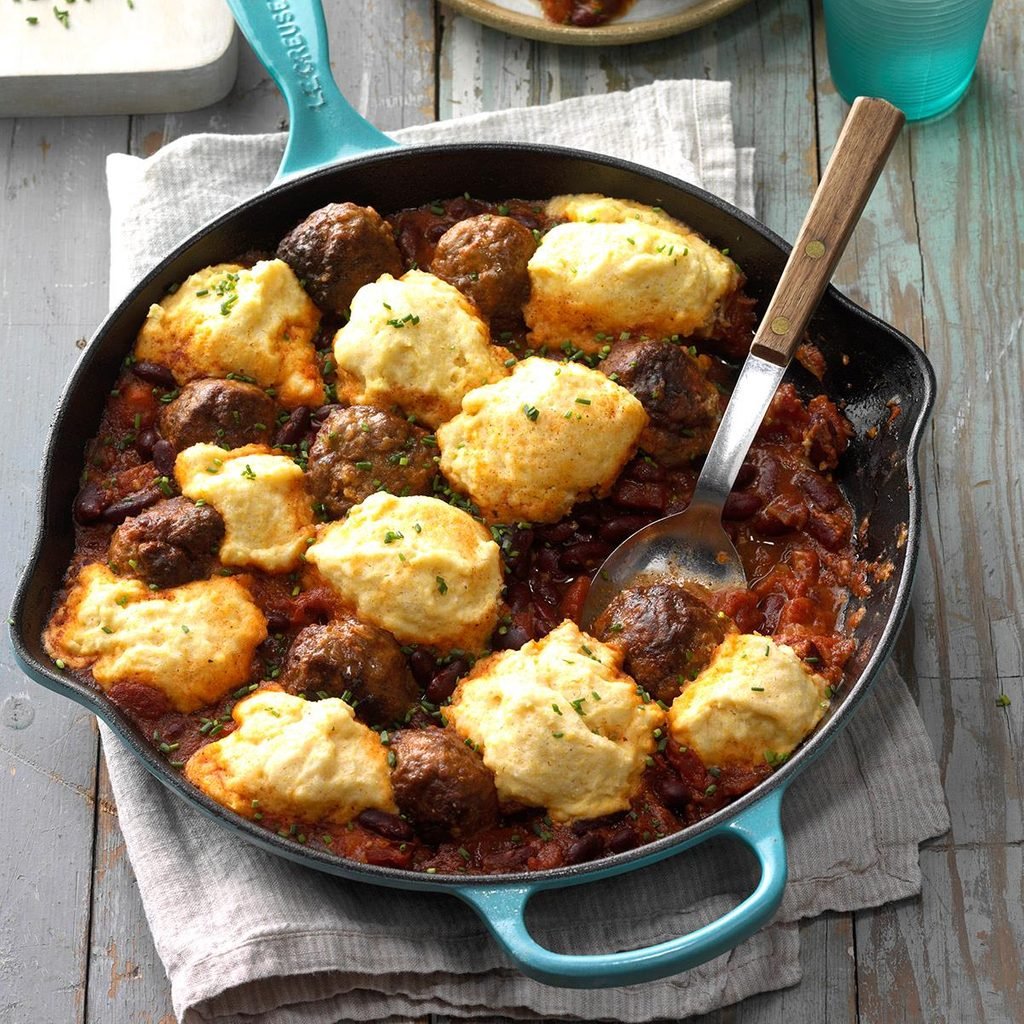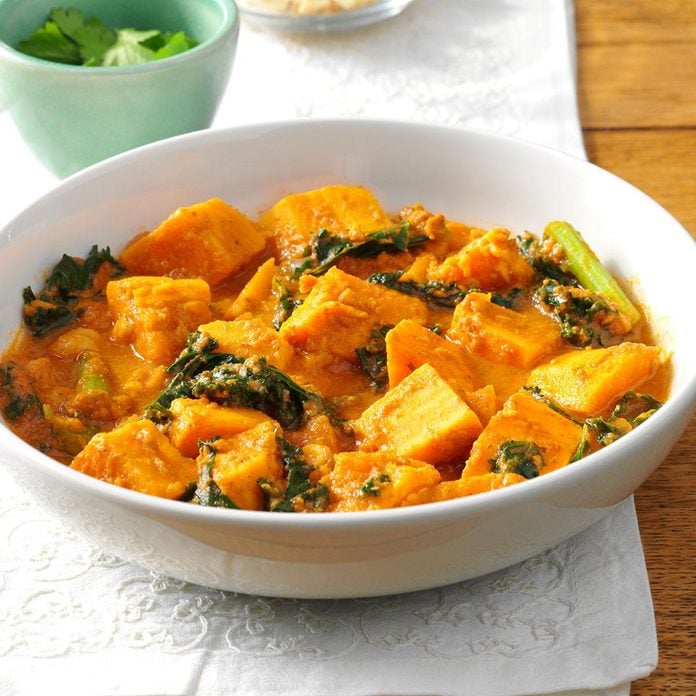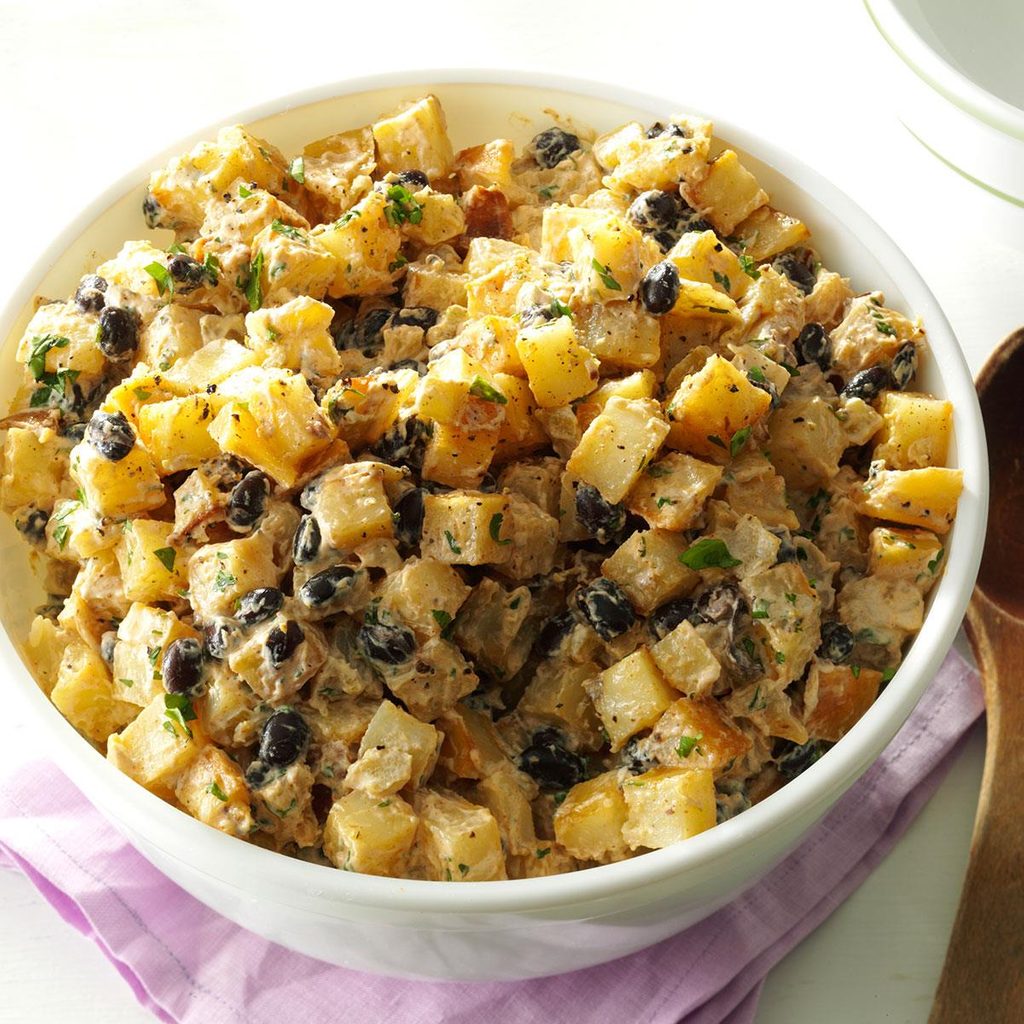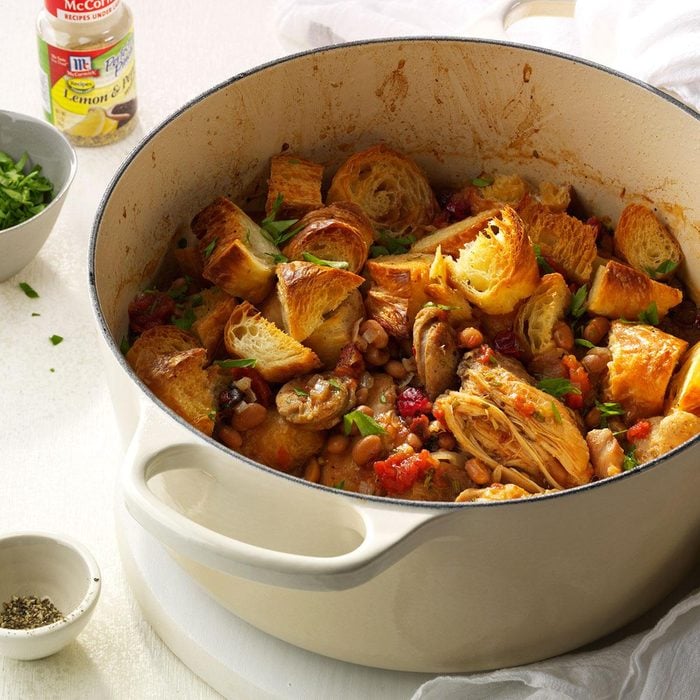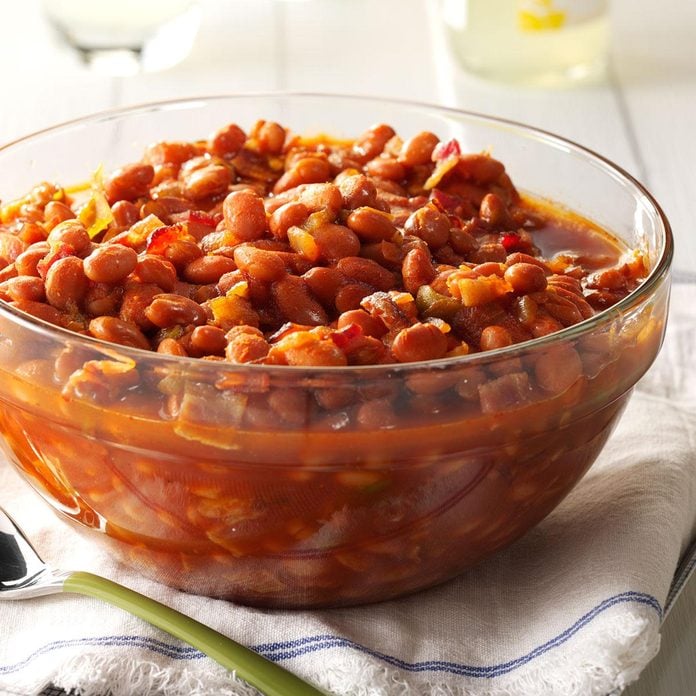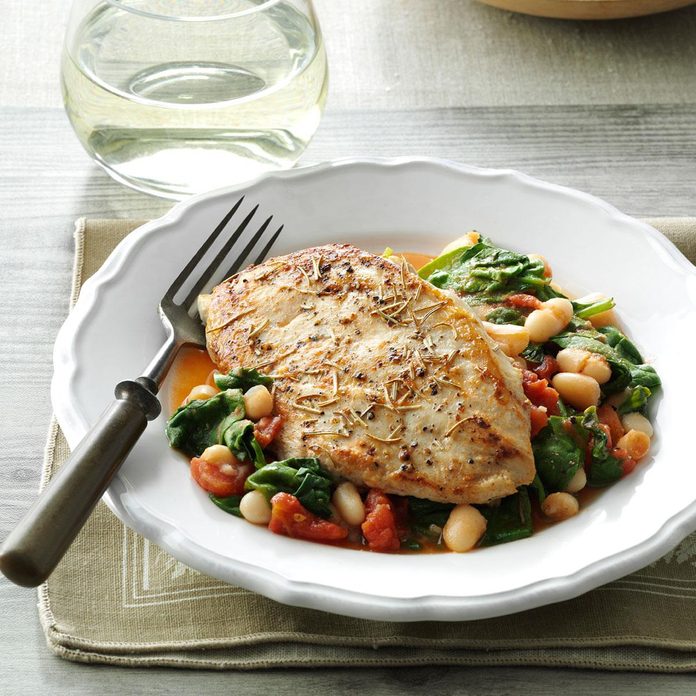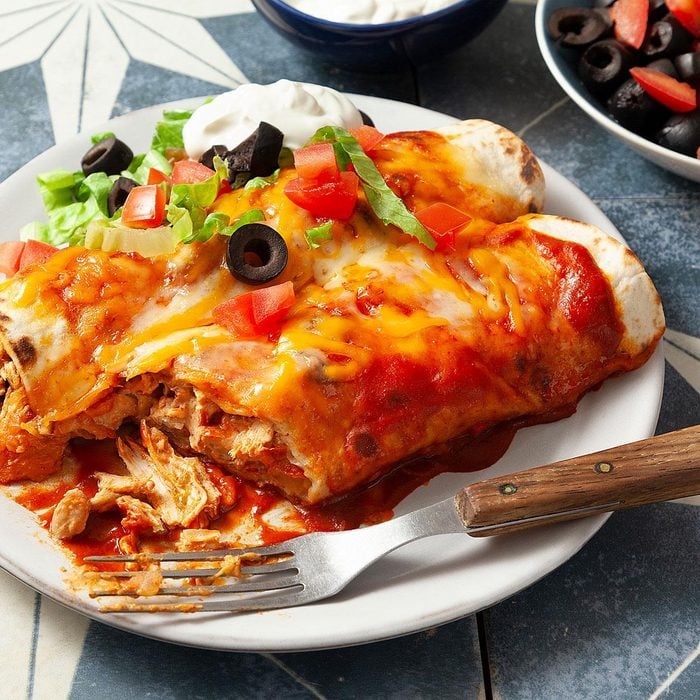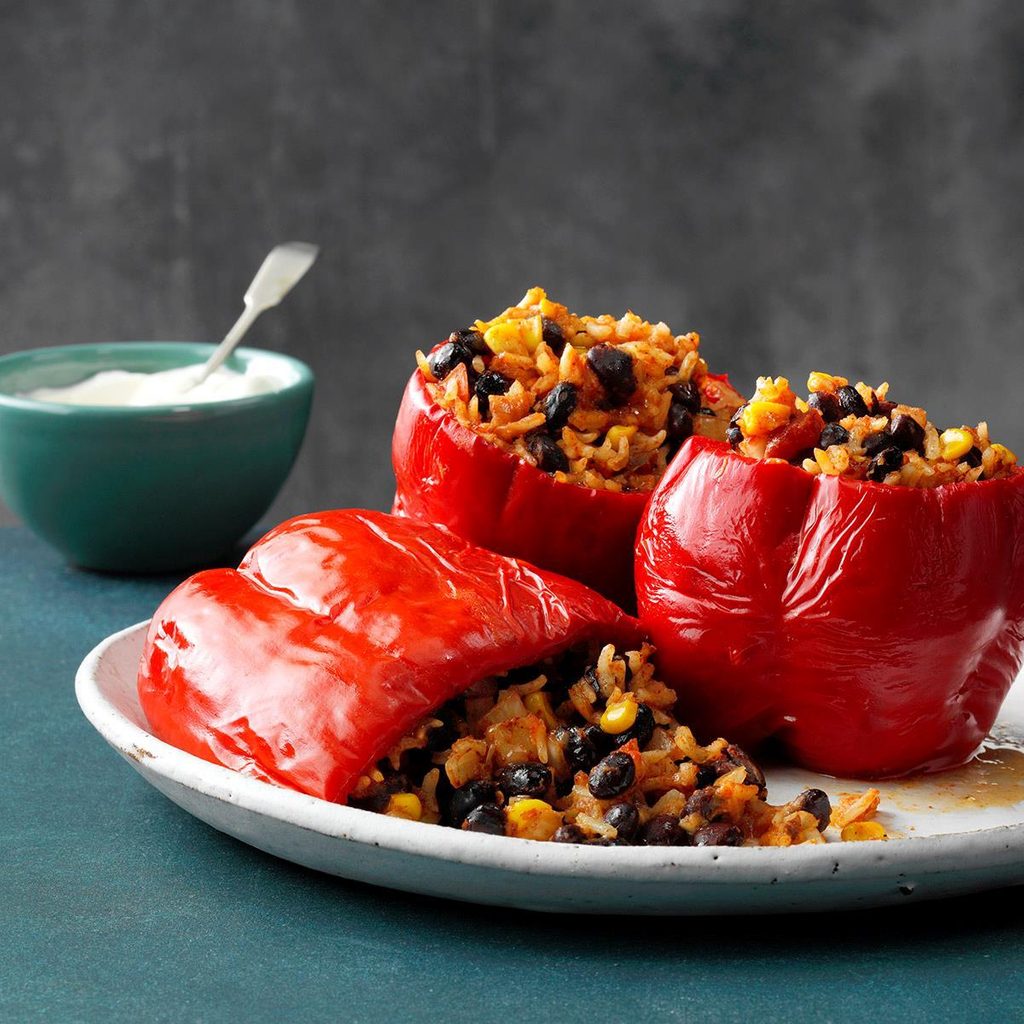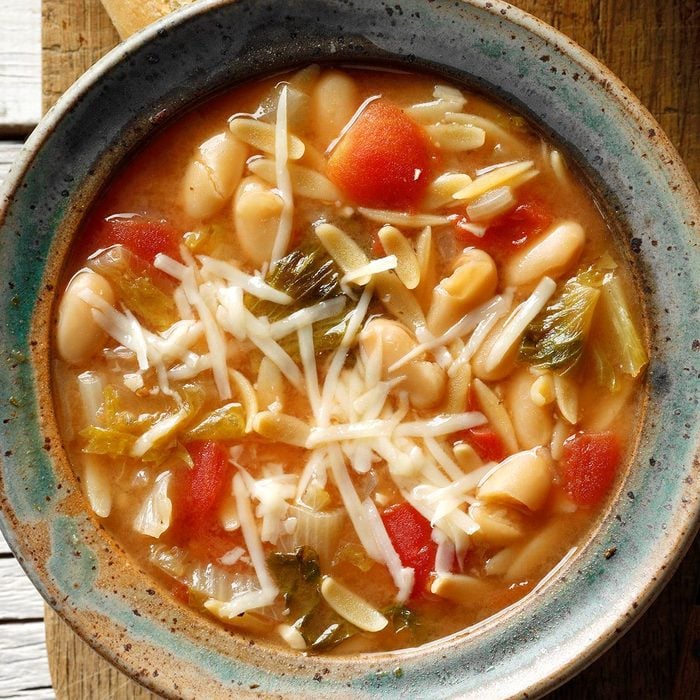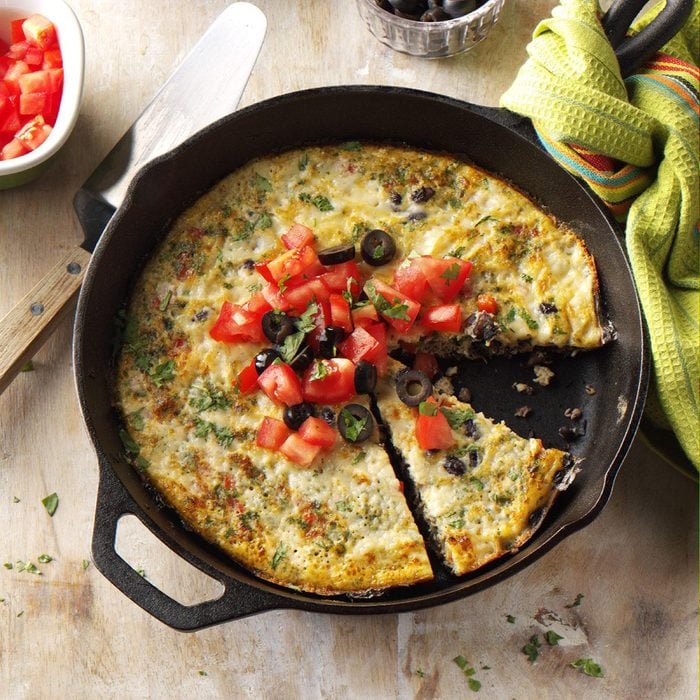Prefer canned beans? Try these recipes.
Quickpea CurryThis colorful curry is a nice change of pace for a busy weeknight. I like to substitute fresh peas for frozen when they're in season. —Beth Fleming, Downers Grove, Illinois
Spaghetti & Meatball Skillet SupperI developed this one-skillet spaghetti and meatball dish to cut down on cooking time on busy nights. The beans, artichokes and tomatoes bump up the nutrition factor, while the lemon and parsley make it pop with brightness. —Roxanne Chan, Albany, California
Mexi-Stroni SoupIf you're a fan of classic minestrone but love bold Mexican flavors, this soup's for you! It's pumped up with spices, veggies and pasta for a filling bowl of fun. —Darlene Island, Lakewood, Washington
Healthy Greek Bean DipThis crowd-pleasing appetizer is healthy to boot! Folks will love to eat their veggies when they can dip them in this zesty, fresh alternative to hummus. —Kelly Silvers, Edmond, Oklahoma
Texas Chili FriesThe delicious chili goes together in minutes and then cooks while you run errands. The only way to make it even better is to pour it over crisp french fries and sprinkle with cheese to make Texas chili fries. —Joan Hallford, North Richland Hills, Texas
Chorizo & Grits Breakfast BowlsWhile growing up, I bonded with my dad over chorizo and eggs. My fresh approach combines them with grits and black beans for this chorizo breakfast bowl. You can even add a spoonful of pico de gallo. —Jenn Tidwell, Fair Oaks, California
Chicken PizzaMy fun twist on typical pizza is an excellent way to use up leftover pesto. And since it’s loaded with protein-rich chicken and black beans, it’s hearty enough to satisfy everyone! —Taste of Home Test Kitchen, Milwaukee, Wisconsin
Chili-Lime Roasted ChickpeasLooking for a lighter snack that's still a crowd pleaser? You've found it! These zesty, crunchy chickpeas will have everyone happily munching. —Julie Ruble, Charlotte, North Carolina
Balsamic Three-Bean SaladHere's my little girl's favorite salad. She devours it just about as fast as I can make it. I suggest preparing it ahead of time so the flavors can get to know each other. —Stacey Feather, Jay, Oklahoma
Chipotle Butternut Squash SoupMy hearty soup uses herbs and vegetables from the garden along with convenient pantry items, so it’s easy, fast and mostly fresh. Your family will devour it. —Roxanne Chan, Albany, California
Chili Mac CasseroleThis cheesy casserole uses several of my family's favorite ingredients, including macaroni, kidney beans, tomatoes and cheese. Just add a leafy salad for a complete meal. —Marlene Wilson, Rolla, North Dakota
Bean & Beef Slow-Cooked ChiliThis chili may be already chock-full, but we love to build it up even more with toppings like pico de gallo, red onion, cilantro and cheese. —Mallory Lynch, Madison, Wisconsin
Beef 'n' Bean TortaThis zesty dish is a favorite of mine because it has a wonderful Southwestern taste and is easy to prepare. I serve it on nights when we have only a few minutes to eat before running off to meetings or sports events. —Joan Hallford, North Richland Hills, Texas
Best Ever Beans and SausageWhen my wife asks what she should make for a gathering, she's always told to bring this—and a couple of copies of the recipe! — Robert Saulnier, Clarksburg, Massachusetts
Christmas Tortellini & Spinach SoupI made this soup for the first time in the summer, but when I saw its bright red and green colors, my first thought was what a perfect
Christmas Eve dinner idea! —Marietta Slater, Justin, Texas
Black Bean & Corn QuinoaSome vegan quinoa recipes are boring, but this one definitely isn't. My daughter’s college asked parents for the best quinoa recipes to use in the dining halls. This healthy quinoa recipe fits the bill. —Lindsay McSweeney, Winchester, Massachusetts
Caribbean Shrimp & Rice BowlI had a similar rice bowl on vacation and re-created this lighter version at home. It takes me back to the islands every time I make it. Try grilling the shrimp for more beachy flavor. —Lauren Katz, Ashburn, Virginia
Southwestern Pulled Pork CrostiniAs a different take on crostini, these apps are fantastic for tailgating and casual parties alike. —Randy Cartwright, Linden, Wisconsin
Cassoulet for TodayFrench cassoulet is traditionally cooked for hours. This version of the rustic dish offers the same homey taste in less time. It’s easy on the wallet too. —Virginia Anthony, Jacksonville, Florida
Tuscan Sausage & Bean DipThis is a spinoff of a Mexican dip I had once. The original was wicked good, but since I was going through an "I’m-so-over-Mexican-dip" phase, I decided to switch it up. Take it to a party—I'll bet you no one else will bring anything like it! —Mandy Rivers, Lexington, South Carolina
Chickpea & Potato CurryI make chana masala, the classic Indian chickpea curry, in my slow cooker. First browning the onion, ginger and garlic really makes the sauce amazing. —Anjana Devasahayam, San Antonio, Texas
Easy Chicken Tamale PieAll you need are some simple ingredients from the pantry to put this slow-cooker meal together. I love the fact that I can go fishing while it cooks. —Peter Halferty, Corpus Christi, Texas
Firehouse ChiliAs one of the cooks at the firehouse, I used to prepare meals for 10 men. This firehouse chili recipe was among their favorites. —Richard Clements, San Dimas, California
Grilled Bean BurgersThese juicy veggie patties have major flavor with cumin, garlic and a little chili powder. They hold their own against any veggie burger you‘d buy at the supermarket. —Marguerite Shaeffer, Sewell, New Jersey
Penne with Tomatoes & White BeansI learned how to make this dish from friends in Genoa, Italy, where they're known for creating tasty combinations of veggies, pasta and beans. You can sub feta cheese to give this a Greek twist. —Trisha Kruse, Eagle, Idaho
Yankee RancherosAfter my in-laws began affectionately referring to me as a Yankee, I decided I had to learn to make some Mexican dishes. These are super easy and make my Tex-Mex-loving family happy—even if they do come from a Northerner!. —Darla Andrews, Boerne, Texas
Quinoa-Stuffed Squash BoatsMy colorful “boats” with quinoa, garbanzo beans and pumpkin seeds use delicata squash, a winter squash with edible skin that’s cream-colored with green stripes. In a pinch, acorn squash will do—but don't eat the skin! —Lauren Knoelke, Milwaukee, Wisconsin
Black Bean Turkey ChiliThis busy-day chili is packed with flavor. We make it ahead and freeze some to eat later. —Marisela Segovia, Miami, Florida
Black Bean and Rice EnchiladasI love Mexican food, but I'm always looking for ways to make it more healthy. I reworked a dish that I have enjoyed in restaurants to suit my taste and lifestyle. —Christie Ladd, Mechanicsburg, Pennsylvania
Black Bean-Mango SaladThis fresh mango salad is a lively side dish for chicken or fish. Simple to put together and pack for a picnic, it’s a yummy way to slip more fruit and veggies into meals.—Donna Hollon, Port Orchard, Washington
Smoky Chicken NachosWhat's game day without can't-stop-munching nachos? Featuring layers of crunchy tortilla chips, black beans and a creamy, smoky chicken mixture, this appetizer will disappear before the second quarter. —Whitney Smith, Winterhen, Florida
Roasted Curried Chickpeas and CauliflowerWhen there’s not much time to cook, try roasting potatoes and cauliflower with chickpeas for a warm-you-up dinner. It's a filling meal on its own, but you can add chicken or tofu to the sheet pan if you'd like. —Pam Correll, Brockport, Pennsylvania
Black Bean Potato au GratinThe addition of black beans and vegetables adds hearty protein and fiber to this tasty side dish. For a southwestern twist, add a handful or two of chopped cooked ham or chorizo sausage and replace the peas with 1 cup of frozen, thawed corn. —Erin Chilcoat, Central Islip, New York
Pico de Gallo Black Bean SoupEveryone at my table goes for this feel-good soup. It is quick when you’re pressed for time and beats fast food, hands down. —Darlis Wilfer, West Bend, Wisconsin
Indian Spiced Chickpea WrapsRaita, an Indian condiment made with yogurt, elevates this vegetarian dish to a satisfying gourmet wrap. If you're in the mood to experiment, try diced mango or cucumber for the pineapple and add fresh herbs like cilantro or mint. —Jennifer Beckman, Falls Church, Virginia
Tomato & Garlic Butter Bean DinnerOn the days I get home late and just want a warm meal, I stir together tomatoes, garlic and butter beans. Ladle it over noodles if you're in the mood for pasta. —Jessica Meyers, Austin, Texas
Spicy Sweet Potato Kale Cannellini SoupThis cross between a soup and a stew fits the meatless Monday bill quite nicely. It warms you right up, and satisfies without leaving you overstuffed.—Marybeth Mank, Mesquite, Texas
Buenos Dias BreakfastI love the way the tortilla strips puff up when this is baked. It is a terrific no-fuss recipe that everyone in my family enjoys, even the meat lovers. —Barbara Burge, Los Gatos, California
Quinoa & Black Bean Stuffed PeppersIf you're thinking about a meatless meal, give these no-fuss peppers a try. They come together with just a few ingredients and put a tasty spin on a low-fat dinner! —Cindy Reams, Philipsburg, PA
Cabbage and Beef SoupWhen I was a little girl, I helped my parents work the fields of their small farm. Lunchtime was always a treat when Mother picked fresh vegetables from the garden and simmered them in her big soup pot. We loved making this delicious recipe. —Ethel Ledbetter, Canton, North Carolina
Layered Cornbread SaladWhen the garden comes in, we harvest the veggies and layer them with cornbread and sweet relish for this snappy salad. Everyone wants seconds. —Rebecca Clark, Warrior, Alabama
Cajun-Style Beans and SausageBeans and rice make the perfect meal because they're well-balanced, an excellent source of protein, and easy to prepare. The sausage adds full flavor to the recipe, and traditional pork sausage lovers won't even notice that chicken sausage is used in this dish. —Robin Haas, Cranston, Rhode Island
White Turkey ChiliHere's proof that chili doesn't have to be red. I combined several recipes and changed flavors until the recipe was just right. Trust me, this one is a keeper. —Tina Barrett, Houston, Texas
Santa Fe Chipotle ChiliSausage and ground beef make this spiced chili a meat lover's delight. I can freeze and reheat it later without sacrificing any of the flavor. —Angela Spengler, Tampa, Florida
Quinoa TabboulehWhen my mom and sister developed several food allergies, we had to modify many recipes. I substituted quinoa for couscous in this tabbouleh. Now we make quinoa tabbouleh all the time! —Jennifer Klann, Corbett, Oregon
Championship Bean DipMy friends and neighbors expect me to bring this irresistible dip to every gathering. When I arrive, they ask, "You brought your bean dip, didn't you?" If there are any leftovers, we use them to make bean and cheese burritos the next day. —Wendi Wavrin Law, Omaha, Nebraska
Tilapia TostadasEven my non-fish-loving family enjoys this recipe. It’s a winner in my book. —Jennifer Kolb, Overland Park, Kansas
Chicken Cassoulet SoupAfter my sister spent a year in France as an au pair, I created this lighter, easier version of traditional French cassoulet for her. It uses chicken instead of the usual duck.—Bridget M. Klusman, Otsego, Michigan
Confetti Corn QuesadillasThis easy and convenient meal is easily changed to fit any family's picky eaters. You can even sneak in protein, dairy and veggies and the kids will never know this is relatively good for them. I try to keep a batch in the fridge for a quick and hearty lunch. —Carey Hunt, Portland, Oregon
Pasta Fagioli al FornoThe name of this Italian-inspired dish means "baked pasta with beans." But my busy family translates it as "super satisfying dinner." —Cindy Preller, Grayslake, Illinois
Classic Texas CaviarI adapted this texas caviar from one in a cookbook I received a long time ago, and now, I can't imagine a get-together at my house without this quick and healthy appetizer. —Becky Oliver, Fairplay, Colorado
Coconut-Ginger Chickpeas & TomatoesThis is my go-to quick dish. When you add tomatoes, you can also toss in some chopped green peppers (jalapenos, if you like heat) to make it even more colorful. —Mala Udayamurthy, San Jose, California
Curried Chicken SoupMy German mother would occasionally cook dishes that were not traditional German recipes. One of my favorites was her Curry Chicken Soup. I've added my own touches to it, such as the chickpeas, coconut milk and fresh cilantro.—Deanna Hindenach, Paw Paw, Michigan
Southwestern RiceI created this colorful side dish after eating something similar at a restaurant. It complements any Tex-Mex meal wonderfully. Sometimes I add cubes of grilled chicken breast to the rice to make it a meal in itself. —Michelle Dennis, Clarks Hill, Indiana
Mediterranean Tortellini SaladOne of my childhood friends moved to Italy 20 years ago. During a recent visit to see her, I enjoyed a scrumptious salad made with tortellini and fresh vegetables. I fell in love with the dish and have been trying to recreate ever since. How'd I do? —Kelly Mapes, Fort Collins, Colorado
Contest-Winning Easy MinestroneThis minestrone soup recipe is special to me because it’s one of the few dinners my entire family loves. And I can feel good about serving it because it’s full of nutrition and low in fat. —Lauren Brennan, Hood River, Oregon
Southern-Style Egg RollsSausage, black-eyed peas and turnip greens give these unique egg rolls a decidedly southern accent. When I bring them to a party, I always come home with an empty plate. —Holly Jones, Kennesaw, Georgia
Spicy Sweet Shrimp with Pineapple SalsaI wanted to find a way to use pineapple salsa in a recipe. I came up with this super simple, delicious and quick dish! —Erin Schillo, Northfield, Ohio
Skillet Southwestern Chicken SoupThis hearty soup is chockfull of chicken, corn, black beans and diced tomatoes seasoned with zippy southwestern flavor. Mexican cornbread makes a delicious accompaniment. —Terri Stevens, Ardmore, Oklahoma
Double Jack MacThis spicy mac and cheese recipe came about when I asked my two sisters what they would like to add to mac and cheese to make it special. One said pepper jack cheese and the other said black beans. I liked both of the ideas and this is the result. The black beans add color and nutrition. The pepper jack cheese adds zip and fun. —Andrea Johnson, Freeport, Illinois
Mediterranean Turkey SkilletI've always heard that it’s important to eat a rainbow of colors to get all of the nutrients we need. Thanks to my garden-grown veggies, this dish certainly fits the bill. —Nicole Ehlert, Burlington, Wisconsin
Cornbread Pizza WheelsThis hearty, colorful snack looks like you spent a lot of time, but it's simple to make. —Patrick Lucas, Cochran, Georgia
Hearty Pasta FagioliHere's a convenient spin on a classic Italian favorite. Spaghetti sauce and canned broth form the flavorful base. —Cindy Garland, Limestone, Tennessee
Fresh Spinach Tamale PieI got this recipe from my mother, who loved quick and easy meals for dinner. I made a few variations by adding spinach, bell peppers and fresh corn. The changes were well worth it––my family and friends love this dish!—Nancy Heishman, Las Vegas, Nevada
Marinated Three Bean SaladFresh herbs and cayenne pepper provide the fantastic flavor in this marinated salad featuring fresh veggies and canned beans. —Carol Tucker, Wooster, Ohio
Spicy Bean and Beef PieMy daughter helped me come up with this recipe when we wanted a one-dish meal that was different than a casserole. This pie slices nicely and is a fun and filling dish. —Debra Dohy, Massillon, Ohio
Contest-Winning Pepperoni Pizza ChiliPizza and chili together—what could be better? Fill folks up at halftime when you set out bowls of this chili. —Jennifer Gelormino, Pittsburgh, Pennsylvania
Enchilada Casser-Ole!My husband loves this casserole, so it never lasts too long in our house. Packed with black beans, cheese, tomatoes and southwestern flavor, it's an impressive-looking entree that's as simple as it is delicious. —Marsha Wills, Homosassa, Florida
Fourth of July Bean CasseroleThe outstanding barbecue taste of these beans makes them a favorite for cookouts all summer and into the fall. It's a popular dish, even with kids. The beef makes it so much better than plain pork and beans. —Donna Fancher, Lawrence, Indiana
Southwestern CasseroleI’ve been making this mild family-pleasing southwest casserole for years. It tastes wonderful and fits nicely into our budget. Best of all, the recipe makes a second casserole to freeze and enjoy later. —Joan Hallford, North Richland Hills, Texas
Whole Wheat Orzo SaladIn less than 30 minutes, I can put together this hearty salad of pasta, white beans and veggies – and it’s good for a crowd. — Mya Zeronis, Pittsburgh, Pennsylvania
Italian Sausage and Kale SoupThe first time I made this colorful soup, our home smelled wonderful. We knew it was a keeper to see us through cold winter days. —Sarah Stombaugh, Chicago, Illinois
No-Fry Black Bean ChimichangasMy chimichangas get lovin’ from the oven so they’re a bit healthier. Black beans and corn make it meatless. And it’s a smart way to use leftover rice. —Kimberly Hammond, Kingwood, Texas
Hacienda Hash BrownsI use a clear glass dish to show off my hash brown bake. The bold pepper, cilantro, cumin and garlic make this potato-egg casserole extraordinary. —Jeanne Holt, Mendota Heights, Minnesota
Spicy Lentil & Chickpea StewThis recipe came to me from a friend who had worked at a health food store. I changed a few things until I found a version that my family loved. My son doesn't like things too spicy, so I make the stew milder for him and add a sprinkle of extra spice in mine. My husband, who farms, works outdoors for long hours at a time and finds this soup hearty enough to keep him satisfied. —Melanie MacFarlane, Bedeque, Prince Edward Island
Sweet Potatoes with Cilantro Black BeansAs a vegan, I'm always looking for impressive dishes to share. Sweet potatoes loaded with beans and a touch of peanut butter are one of my mom’s favorites. —Kayla Capper, Ojai, California
Spicy White ChiliI thought the original version of this dish was fine. But my son can't get enough spice, so I added green chiles and other seasonings until I'd created a quick and easy chili he's wild about. —Carlene Bailey, Bradenton, Florida
Festive Bean SaladI had experimented with all kinds of bean salads before I hit on this one. My husband loves all the different bean varieties, and corn adds to the color and texture.—Dale Benoit, Monson, Massachusetts
Huevos RancherosMy husband and I had huevos rancheros while visiting Cuernavaca, Mexico, and he loved the meal so much he asked me to cook it for him when got home. My version is suited to my family's preference for sunny side up eggs, but poached or scrambled eggs would be just as tasty. —Cheryl Woodson, Liberty, Missouri
Meatball Chili with DumplingsMy family enjoys this delicious recipe—it's like a spicy meatball stew with dumplings!—Sarah Yoder, Middlebury, Indiana
Mediterranean Bulgur BowlYou can also transform this tasty bowl into an Italian version with mozzarella, pesto, tomatoes, spinach and basil. —Renata Smith, Brookline, Massachusetts
African Peanut Sweet Potato StewBack when I was in college, my mom made an addicting sweet potato and peanut stew. I shared it with friends, and now all of us serve it to our own kids. They all love it, of course. —Alexis Scatchell, Niles, Illinois
Mexican Roasted Potato SaladMy husband is the No. 1 fan of this south-of-the-border potato salad. The leftovers make an awesome late-night snack, straight from the fridge. —Elisabeth Larsen, Pleasant Grove, Utah
New England Bean & Bog CassouletWhen I moved to New England, I embraced the local cuisine. My cassoulet with baked beans pays tribute to a French classic and to New England in one hearty, heartwarming dish. —Devon Delaney, Westport, Connecticut
Patio PintosAny time Mom had the gang over for dinner, she made these pinto beans. Once she made a batch for my cousin’s birthday and he ate the entire thing. —Joan Hallford, North Richland Hills, Texas
Refried Bean TostadasFor a change of pace, you can substitute purchased tostada shells for tortillas or add more lettuce and use taco salad shells. —Taste of Home Test Kitchen
Rosemary Chicken with Spinach & BeansWith two young boys constantly on-the-go, I’m always looking for ways to simplify meals. This recipe uses just one skillet, making it a cinch to prepare dinner for a hungry family in half an hour. —Sara Richardson, Littleton, Colorado
Easy Chicken EnchiladasThis chicken enchiladas recipe is so quick and easy, and I always receive a ton of compliments. It quickly becomes a favorite of friends whenever I share the recipe. Modify the spiciness with the intensity of the salsa and the green chiles to suit your taste. —Kristi Black, Harrison Township, Michigan
Slow-Cooked Stuffed PeppersMy favorite kitchen appliance is the slow cooker, and I use mine more than anyone else I know. It does a great job with this good-for-you dish. —Michelle Gurnsey, Lincoln, Nebraska
Tilapia with Corn SalsaMy family loves fish, and this quick and tasty dish is very popular at my house. Though it tastes like it takes a long time, it cooks in minutes under the broiler. We enjoy it with lemon wedges with couscous on the side. —Brenda Coffey, Singer Island, Florida
Simple Vegetarian Slow-Cooked BeansWhen I have a hungry family to feed, these tasty beans with spinach, tomatoes and carrots are a go-to dish. This veggie delight is frequently on our menu. —Jennifer Reid, Farmington, Maine
White Bean Soup with EscarolePantry staples make this healthy soup oh, so simple to prepare. When I can't find escarole, I use fresh spinach. Just add to the soup pot moments before serving. —Gina Samokar, North Haven, Connecticut
Black Bean & White Cheddar FrittataThis is one of my favorite comfort foods for breakfast or even a quick dinner. I like to make it with lime salsa. But if you're looking for something with more kick, use hot salsa or add some chipotle pepper. —Aysha Schurman, Ammon, Idaho
